#for context: three men and a baby is like a third of the way written
Explore tagged Tumblr posts
Text
WIP Writing Poll ✨
thank you @mellaithwen for tagging me 😘💖 gonna preface this by saying i haven't actually started writing some of these fics so the end result may initially be a 2k oneshot to gauge interest in whether or not people would actually like to read the full thing but yeah!!! i haven't had time to write in a Long Time so here's hoping i can deliver the goods for you in the next week or so once the final results are in 🥰
i think most people have done this by now but if not, consider yourself tagged!! ❤️
#meme thing#i'm very curious as to what you would like to read#i already know which one amy's gonna pick lmfao#for context: three men and a baby is like a third of the way written#royalty au i have the start written#and i haven't written anything for the other three yet#but don't let that sway you!!!!#go with ur heart
15 notes
·
View notes
Text
Slay the Princess Narrator, Princess, Voices in Japanese
<<Vessel Names Part 1(Chapter I & II + Razor III & IV) <<Vessel Names Part 2(Chapter IIIs) Part 4(TLQ, TSM, Echo)>>
VOICES TIME BABY
Actually, I'm gonna go in chronological order of character mentions. So, we will start with:
The Narrator ナレーター(Nareetaa) [Narrator]
Simple and direct. There is a word for "narrator" that is of Japanese origin(語り手 lit. "Story hand" meaning narrator/storyteller), but the English word is the one more widely used. He also says "I" using the first-person pronoun 私(watashi), I'm assuming to indicate his "formal" attitude as, although men can use it, it's usually only in formal situations/you don't know someone well. He is of course referred to in third person with the kanji 彼(kare) meaning "he" or "him", but some voices like Contrarian and Smitten use katakana for him instead of kanji(カレ) for some different type of emphasis, I'm assuming.
Now in the Narrator's first lines, he tells you that there is a
Princess(or "The Princess" sometimes) プリンセス(Purinsesu) [Princess]
Like I mentioned in the "Princess and the Dragon" portion of last post, the Princess always referred to with the English word "Princess" rather than the Japanese word for princess.(She's also very often referred to with the pronoun 彼女(kanojo) meaning "she", of course). She tends to use the first person pronoun わたし(watashi), like the Narrator, although in her case it's written simply in hiragana, I assume to show less formality and more just how she refers to herself. 私/わたし is also used by women casually, in contrast to what I said in the Narrator section. She also tends to use あなた(anata, "you") for her 2nd person pronoun(formal/regular way to say "you").
The 1st and 2nd person pronouns the Princess uses also tends to change with each chapter:
The Spectre, Stranger(Chapter II), Damsel, Wild, Grey - 1st わたし(watashi, わたしたちwatashi-tachi when Stranger Princesses merge)・2nd あなた(anata)
Base Princess(Chapter I & Heart of TSM)*, The Nightmare, Moment of Clarity, Razor, Prisoner, Cage, Princess and the Dragon, Happily Ever After, Stranger(Heart of the Shifting Mound)- 1st 私(watashi, 私たちwatashi-tachi for Stranger)・2nd あなた
The Adversary, Eye of the Needle, Fury, Wraith - 1st 私・2nd お前(omae, can be seen as rude or more colloquial, for someone of equal/lower rank)
The Tower, Apotheosis- 1st 我(ware, not really actually used in real life, but gives a sense of profound, old, important-ness, typically used by king/god/godlike characters)・2nd お前(omae, though she also calls us 小鳥kotori "little bird")
The Beast - 1st アタシ(atashi, feminine, more casual form of watashi)・2nd オマエ(omae, she also calls us ヒヨコhiyoko "fledgling", all three of these words are written in katakana)
The Witch - 1st あたし(atashi)・2nd あんた(anta, colloquial/familiar form of anata, often considered rude, sometimes spiteful)
The Thorn - 1st あたし・2nd あなた(omg she uses the same 1st as the Witch but switches from "anta" back to "anata" omg y'all I'm cryingggg😭😭)
*Chapter I Princess tends to switch from あなた to お前 when antagonized(pre Tower, Adversary, Beast, Witch)
OK SORRY I KNOW THIS WAS SUPPOSED TO BE VOICES IM SO SORRY
Now let's start with the homie, the one who's always got your back
The Voice of the Hero 勇者の声(Yuusha no Koe) [Voice of the Hero]
Simple enough. Something to note is that there are two words for "hero" in Japanese, 英雄(eiyuu) and 勇者(yuusha). 英雄(eiyuu) is what you call a great person, someone respected for accomplishing something and leaving great impact on society. 勇者(yuusha) is moreso a brave person sent on a quest of adventure to defeat evil/protect others. The former emphasizes the impact and admiration of their achievements, while the latter emphasizes courage and bravery. Someone said something like "勇者 is someone on a journey to slay a dragon, 英雄 is someone who had already come back home from slaying a dragon". In the context of the Voice of the Hero, rather than someone with emphasis on the change he's made in the world, the emphasis is on his morals and good-intentioned actions. He uses ボク(boku) as his 1st person pronoun, which gives him a little bit of a "good boy" typa feel. Or at least some politeness. It's also noted that he uses katakana for boku instead of the kanji 僕(boku)(which, the Long Quiet himself actually uses out loud).
I'm doing the voices in the same order as their respective Chapter II Princesses in the first post(based off the "Memories" menu)
The Voice of the Stubborn 頑固者の声(Gankomono no Koe) [Voice of the Stubborn]
Yeah okay, this one's the same. 頑固者(Gankomono) means "stubborn person". He uses 俺(ore) as his 1st person pronoun, a very masculine pronoun, can be seen as rude in a formal setting, but is very typical and normal for casual men speech.
The Voice of the Broken 負け犬の声(Makeinu no Koe) [Voice of the Loser]
Now this one's insulting. 負け犬 (makeinu) means loser, failure, you get the picture. Made up of the words 負ける(makeru, to lose/to be defeated) and 犬(inu, dog). But it's very fitting I must say(Broken would totally bark for the Tower 100%). He uses the 1st person pronoun 僕(boku).
The Voice of the Cold 冷血漢の声(Reiketsukan no Koe) [Voice of the Cold-Blooded]
冷血漢(reiketsukan) mean "cold-blooded person" or "coldhearted person", or simply "heartless". 冷(rei) meaning cold and 血(chi) meaning blood. Same meaning as in English, someone who can kill a Princess with no hesitation. Like Stubborn, he uses 俺(ore). (He also tends to use quite blunt/rude ways to refer to the princess)
The Voice of the Paranoid 妄想狂の声(Mousoukyou no Koe) [Voice of the Delusional]
妄想(mousou) means delusion, while 狂(kyou) refers to lunatic, or insanity or mental abnormality. Now, delusional isn't exactly the same as paranoid, but the Paranoid can come off as delusional sometimes. Of course, anything we believe in the construct becomes real, so the Nightmare route is full of our real delusions. He is the intrusive thoughts part of our brain that manifests into reality. And in other routes, the Paranoid can come off as a bit insane(the Cage and Apotheosis especially make him seem more erratic). He also uses 俺(ore).
The Voice of the Cheated 野放図の声(Nohouzu no Koe) [Voice of the Unruly]
野放図(nohouzu) can mean wild, arrogant, unruly, but it can also mean unchecked, uncontrolled, unregulated. I put unruly as I thought it fits a title better, but in my head I think more like "unhinged". And I guess that kinda does fit the Cheated's personality, his main objective in the Razor is to win against her, and he's basically like "let's keep getting stabbed until there are enough of us to be better than her", definitely not sound of mind(he also has that comment when you take the blade of "let's make her hurt for what she's done to us"). He very much let's his emotions take the better of him, usually hating on the Princess and the bullshit of everything or spiting the Narrator. He's also, again, very unhinged(mentioning dropping the Cage's head and he says "I mean... we could...") His pronoun is also 俺(ore).
The Voice of the Hunted 獲物の声(Emono no Koe) [Voice of the Prey]
This one I don't have much to say, as it's pretty obvious why he's named that way. And it's pretty much the same as the English name. Like the Hero, he uses the pronoun ボク(boku), I think it's in katakana to mirror the Beast's pronouns.(He refers to her with kanji in 彼女(kanojo) but he does refer to her with katakana in アイツ(aitsu, something akin to "that guy" or "that person", when he say's "She's coming(アイツがくる!)")
The Voice of the Opportunist お調子者の声(Ochoushimono no Koe) [Voice of the Easily Elated]
お調子者(ochoushimono) refers to someone who get carried away easily, someone who does whatever they feel/want, someone who gets easily elated from praise and flattery. I think this is both a funny and accurate translation of the Opportunist. We know he definitely gets carried away easily. He says that second line in the game even(freeing the Thorn: "I can do whatever I want, and I believe with with my whole heart...").I can't really think of instances of him getting praised off the top of my head but he does seem to think it will work on other people. He very much goes with the mood, attempting to curry favor so he can make sudden rash decisions out of nowhere. He uses 僕(boku) which I think fits his suck up personality.
The Voice of the Contrarian あまのじゃくの声(Amanojaku no Koe) [Voice of the Contrarian]
Direct and simple translation again. あまのじゃく(amanojaku) refers to someone with a perverse personality, or someone who opposes other's opinions. Interestingly, あまのじゃく can also refer to an actual small demon in Japanese folklore. I just thought it reminded me of that one line from him "Time to get back to our old devilish ways". He also uses 俺(ore).
The Voice of the Skeptic 疑心暗鬼の声(Gishin'anki no Koe) [Voice of the Skeptic]
疑心暗鬼(gishin'anki) is an expression/abbreviation, it means something like "suspicion creates monsters from shadows", it's about how suspecting something can lead you to suspecting everything, and doubt and suspicion makes you jump at shadows. I think this makes some sense, as his hyper-focused perception of things makes him question everything around him. He notices small details that grow into things bigger and more important than they were before. Also 俺(ore).
The Voice of the Smitten 騎士の声(Kishi no Koe) [Voice of the Knight]
This one I find really funny. 騎士(kishi) refers to the medieval type of knight, known for their chivalry and honor, like ones in armor and usually on horseback(騎(ki) relating to horses). I think it makes perfect sense in the context of the Damsel, a knight come to rescue his beloved Princess, to free her from the confines of the cabin. I also think it works in the Thorn for similar reasons. But I think in most other routes it's hilariously out of context, like "damn, this knight guy kinda freaky calling this blade Princess gorgeous/calling this Princess with a dress of her own skin gorgeous" Like the Tower, he uses 我(ware) giving him that old medieval feel, and he addresses the Narrator with 貴君(kikun), meaning "you" used by men in letters addressing their equals/lowers, and he addresses the Princess with 貴女(can be pronounced anata or kijo), polite language used to refer to women in letters. I was planning on this being the last post but I dont think I can fit it all here sorryyyyyyy rest of the stuff will be next post
Edit: added pronouns of voices
<<Vessel Names Part 1(Chapter I & II + Razor III & IV) <<Vessel Names Part 2(Chapter IIIs) Part 4(TLQ, TSM, Echo)>>
#slay the princess#voice of the smitten is so real for that tho#like i would totally ask the fury out#these things take HOURS of my life holy guac
58 notes
·
View notes
Text
Anyway, HSM2 is about internalized homophobia, and no one can tell me otherwise.
High School Musical is one of the most beloved franchises in the world. Teenagers all over the world grew up watching Troy and Gabriella harmonize together. Three movies, and nearly a decade later it’s still beloved by all. The first film easily forgotten in the ashes of the early 2000’s, the third film stuck in a purgatorial limbo of the rather unfortunate late 2000’s. The second film on the other hand sticks out between the ruckus.
The second High School Musical film takes place at Sharpay and Ryan’s family country club, during the summer between junior and senior year. The Wildcats are working summer jobs on the country club, often forced to the beck and call of Ryan and Sharpay themselves. Sharpay uses all her prestige to help Troy with college instead of starting at the bottom ( or rather, in the kitchen washing dishes) with his friends. In the time she’s helping Troy, she is also pushing her brother away; replacing him with Troy in their musical number for the talent show, and refusing to hang out with him in preference for Troy. Ryan becomes vengeful to his twin and starts hanging around the Wildcats in the kitchen. At first, he was met with some distasteful looks and words (most of which from Chad). With the help of Kelsey, and her neutral party, Ryan fits in smoothly with the other teenagers, eventually giving the WildCats all dance lessons.
Throughout the movie, the main conflict continues to be the internal conflict of Troy Bolton. He debates over and over again if he should go through with Sharpay’s shenanigans, or if he wants to “listen to my own heart.” This of course involves Gabriella, as she is Troy’s love interest. She’s not in the second film except for the beginning, then, where she leaves in the middle of the film - in order to create angst for Troy - then when she shows up again in the finally to sing/rejoin Troy.
The conflict in the second film is the combining of Troy’s two worlds. His first - his main world in the first movie, that hence became his secondary world - which is represented by Chad. Then his secondary world - which becomes his main world in this movie - which is represented by Ryan. Chad represents Troy’s masculinity, or his more idealized version of himself. Ryan represents Troy’s femininity or his current version of reality. These two worlds collide in the iconic song “I don’t dance”.
Since this movie - and hence this scene - came out in the early 2000’s, a lot of the innuendoes went over people's heads. Luckily, as the children who watched this movie grew older and more experienced, and the world became more accepting, we’re able to see this song for what it is.
Before getting into the lore and symbolism of the iconic “I Don’t Dance” sequence, context is needed. For most of human history, homosexuality was seen as a sin in all places except ancient times (see: Greece and Japan). The modern age is the most accepting on all fronts, such as sexual orientation, race, and religion. In the early 2000’s, High School Musical director Kenny Ortega was not publicialy out yet. He wouldn’t be till 2014.
Originally, while writing this, my first thought was that Kenny - the director - would be using Troy as a y/n type character to project his insecurities and struggles with masculinity, and what that means in defining his orientation and societal views that would be placed upon him. Then, it came to me later that this is in fact not the case, Troy (and Gabriella - who is in fact a y/n character for the female audience) is more of a character for a man of his time, confused with his own ideals of masculinity and the views of society because, “oh god, I can’t like theater/drama because only queer people and girls like it!” The second point is pushed further with the Troy and Sharpay sub-plot. Sharpay tries to further Troy’s career as a basketball player, though that’s not what he wants anymore, and Troy is no longer sure if that is what he ever wanted to begin with (enter the song “Bet on it” and the hilarious meme “no dad, I’m giving up on your dream”).
Keeping these things in mind - Kenney’s queerness, and Troy’s struggle to realize you can in fact sing and be a heterosexual, wow, revolutionary - it became clear to me that Kenney’s y/n characters were Ryan and Chad.
For those who aren’t into the arts, or find them too difficult after a singular attempt thinking they could write a world class novel on the first go, let me be the first to tell you every author has a y/n character. First, for those who don’t know what y/n stands for, it’s a popular fanfiction trope where a writer will write a story about a character dating, being friends, and so on, with the reader. The y/n stands for “your name” so anyone can be the main character in this story at any time. For a writer of mainstream fictional work, such as High School Musical, Game Of Thrones, Lord Of The Rings, Pride and Prejudice, Harry Potter, Hunger Games, even most comics. Now, most writers or directors aren’t going to be as obvious as having a character not named (or named y/n) or even named Jane (looking at you Jane Austin), the y/n character of many mainstream authors/directors/comic artists and so on is usually the character they feel or have given the most attributes similar to themselves.
It’s the same reason people have favourite characters. You see a fictional character and you either 1. Want to Bob the Builder them, 2. Some sort of weird sex thing, or 3. See more/the most of yourself in this character. Number three - thankfully - is usually the main reason. Some people just create their own favourite characters. An even easier way to think about this, is just projection baby, that’s psych 101.
Before I went off on a small tangent of fictional works and how human emotion plays into creating them (except anything Disney has made in the past decade, and no you can’t change my mind on that) I mentioned that Chad and Ryan are Kenney’s y/n characters. As a queer person myself, it’s clear for me to see the different struggles each of these characters face and how these reflect the queer experience.
So, let’s finally get into it.
Ryan, without it being explicitly said is clearly a character of what people in the early 2000s think a gay man is. He is effeminate, wearing bright coloured outfits with lots of accessories - namely his signature hats - he is also in the theater department doing musicals, and passive/subservient to any of his twin sisters' wills. Yes, now we know gay men aren’t just feminized men, but in the early 2000’s a gay man who can do "masculine" things like change their car oil, like sports, and so on, break the "effeminate" stereotype thus confused many cishet people. Sharpay is painted as more confident - or, for sake of comparability - masculine to her twin in the first movie, and most of the second movie. Making Ryan a bit of her dog who would do anything to get by - painting Ryan as lesser than human, once more, playing into the homophobia of the early 2000's.
Despite the clear stereotypes playing into his character, Ryan is consistently one of the most confident characters in the movie. The other, being his sister of course. This confidence in himself is what gravitates the other characters towards him, either by being intimidated (Troy, thinking Ryan and Gabriella were a thing), or admiration (Chad, by the end of “I don’t dance”).
Chad, on the other hand, is a whole different ball game. While he is confident in the first movie, and the first portion of the second movie, he begins to break more and more when Ryan becomes a more integral part of the Wildcat group. To keep in mind, Chad is also the most vocal about his distaste for Troy’s artistic past-time. When the other Wildcats join Ryan and begin learning how to dance for the talent show at the end of the movie, Chad is also the most vocal about his distaste. The baseball game where “I don’t dance” takes place, is the climax of Chad’s arc and his turn towards acceptance to Ryan/Troy’s hobbies.
Of course, there is more to the “I don’t dance” sequence than just Chad’s realization - the exact one Troy comes to terms with in the second movie as well - of “oh my god I don’t have to be gay to enjoy stereotypical ‘feminine’ things.” That is the main part of the song though, that and all the sexual tension.
Going back to what I’ve stated previously, Chad and Ryan are Kenney’s projection or y/n characters. Let me do a small recap before we get into the nitty gritty of the famous “I don’t dance” video.
Thinking back to the first few paragraphs, I stated that Kenney wasn’t publicly out till 2014, about 7 years after the second movie came out. This could be due to the fact that a) it’s the early 2000’s and everyones still very homophobic, or b) self-doubt that comes with the queer experience. The most likely reason is a mixture of both of these. Because of this, Ryan is the more self-assured version, or idealized version of Kenney that he wants to be. Ryan is confident, never being swayed about his lifestyle (could be read as: sexuality) even though Chad - and most of the wildcats in the first movie - put him through relentless “teasing” and humiliation. He’s confident, almost to a fault, he’s sure of himself, and yet still reaches out a hand to Chad and the other wildcats to show them that they’re just being, kinda dick-ish.
Every queer person wants to be Ryan. Despite his heavily stereotyped characterization, I personally believe he is one of the stronger written characters in the movies, mainly due to Kenney putting the time in to really make Ryan feel like a real person, to give himself some sort of relief of his own anxieties, a chance to see the world through a person who truly has no fear. Unlike Kenney himself.
This is where Chad comes in.
Chad is seen as “confident” in the first movie, the second Troy “leaves” basketball though, all that confidence comes crashing down. His best friend has another hobby - one he thinks is “not right” (it’s okay, you can say gay), - they wont be spending all their time together (first, can you say dependent relationship much, yikes).Chad’s defining characteristic up until their fight that instigate act three of the second movie, is being Troy’s best friend. I’m going to take this as if this were truly the case, and not a decently written character arch. Some people base themselves around their friends and their whole identity on being a friend, that they lose sight of themselves, this mainly in high school of course, when your whole world is really nothing but school, and friends. Newly developed independence is there, but that’s scary, so instead of worrying about the future, cling to something that’s reliable. I’ve seen this happen, mainly at the end of high school, when the “real world” is coming a bit too close for comfort. This could generally be the case if a person is lonely, but for timeline sake I’m going to say Chad has got some anxiety about graduating (considering the second movie takes place the summer of junior year).
His lashing out at Troy’s hobbies and at Troy’s neglectful friendship, make more sense with that background, and are seen more in the second movie where Troy begins spending all his spare time with Sharpay (trying to collect that BAG!). Chad - and others (read: father) - insists that music is not a feasible career option, and Troy should just stick with basketball (like...that is a feasible career option). The tension Chad creates in the studio only grows when the other wildcats decide to take up Ryan’s offer for dance lessons and move from the kitchen, to helping out with the talent show. (Next essay idea: how high school musical two was really about class all along, cause Jesus).
Chad is the less obvious option for a y/n character. Though again, the 2000’s were not as cool people like to pretend they are. Chad - for Kenney - represents what he actually feels, this fear of being rejected for how he is and how he chooses to live his life/lifestyle, so he sticks to something reliable. Ryan is new, and exciting, and confident in a way that Kenney/Chad wish they could be, but in order for that to happen they need to understand that maybe people are complex creatures, and can enjoy multiple hobbies (aka: the same lesson Troy is teaching the viewers, but far less boring). But, for Kenney/Chad facing that thought and that realization is scary, and thus, they lash out at anyone (read this paragraph as: Chad mad jealous of Ryan cause Ryan bomb as fuck).
All this build up, finally comes ahead in the employee baseball match
******
The baseball game is probably the most memorable scene in the whole High School Musical franchise (minus Sharpay’s “Fabulous” solo, but that’s also from the same movie, and it’s kinda rude to give what’s already the best more points); the tension in the scene, and what it implies makes it the best written segment of all three movies, let alone the most entertaining.
Some things to keep in mind from our background information: Chad is missing his bestie and struggling with what being “masculine” really means for him and others. Ryan of course makes this confusing, because the traditional method is being thrown out the window. In short, Chad has internalized homophobia, and Ryan being open - or as open as Disney would let him - is causing all sorts of problems.
Despite the song, “I don’t dance” being logged into our collective skulls for all eternity (you’re probably humming it right now, sorry about that), the very brief interaction of Ryan and Chad before the game is lost on the public consciousness. The two are clearly comfortable with each other, though the distaste seems to be on Chad’s side more than Ryans. So, the two start playfully jabbing at each other before deciding to do a bat toss to see who will be in the outfield first.
Before they begin the bat toss, Ryan says “You don’t think dancing takes some game?” Chad then very clearly checks him out, doing a simple but effective ‘drag-your-eyes-over-them-top-to-bottom-then-smile’ and says “you got game?” (Seen in gif below)
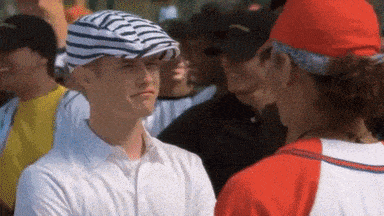
I don’t know how much you know about sex metaphors and how many of those baseball has in it (seriously though, it’s a lot), but with the bat toss, Ryan’s hand ended up on top, and Chad’s under Ryan’s. Let’s ignore this for now, it’ll be implied again later. Ryan’s team starts out in the outfield because he won the bat toss, and hence, the song officially starts.
The first lyrics (ignoring the chores of “hey batter batter, hey batter batter, swing”) is
I'll show you that it's one and the same
Baseball, dancing, same game
It's easy
Step up to the place, start swingin
This part is sung by Ryan, who is taunting Chad out in the outfield. Before the game, as stated, Chad was taunting Ryan about his lack of “game” (both sexual and not sexual metaphor are implied), and now, Ryan has turned those tables around. Baseball - is seen as more masculine than dancing, not as masculine as football or basketball, but it’s up there. Chad is someone who cares about his masculinity, enough to the point that Ryan playing baseball makes him loose his mind. Makes him question his own personal definition of masculinity, if you will.
Ryan says, “baseball, dancing, same game,” impyling that, to him, baseball and dancing are one and the same. That is baffling to Chad, cause well, how can something meant for girls even be close to something meant for boys.
Chad comes back with:
I wanna play ball now, and that's all
This is what I do
It ain't no dance that you can show me, yeah
This only proves my previous point.
I had a conversation with myself about this, and I’ve decided not to include it in this essay, but a second essay may or may not be possible. Basically the premise - the dancing/”musical” moments of High School Musical are conjured up images by those meant to see them (ie: like a visual hallucination, but, not really) but this scene kinda poo-poos that idea.
Now, the thing I am talking about is Ryan and Chad’s peacocking at each other during the time they sing these lyrics. The movements they’re making could be mistaken for dancing - as we automatically assume it is because of the title and themes of the movie - or it could be them just getting ready for the baseball game. Ryan swings his leg over the pitcher's mound, tossing the ball up and down into his glove, making wavy hand gestures, etc. Chad brushes off his gloves, swings his legs, hits the bat on each foot, and so on.
For the peacocking, Chad makes a mock of the ballerina foot stance before strutting over to the home plate. Ryan laughs at this, which earns quite the smirk from Chad himself (see gif below).
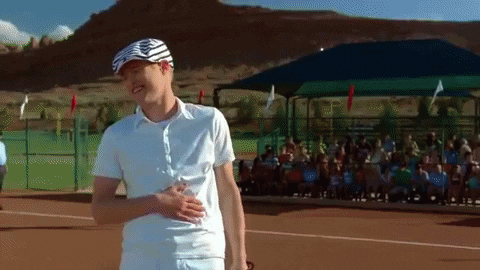
This is when it becomes a conversation.
You'll never know - R
Oh I know - Ch
If you never try - R
There's just one little thing - Ch
That stops me every time, yeah - Ch
Come on - Ch
When Chad says “Come on” it’s when Ryan throws the baseball at him, starting the game, and giving Chad’s team their first strike of the game (get it, it’s funny). Now, obviously we need to talk about the “there’s just one little thing that stops me every time.” As a queer person, I assure you, two of the things that kept me from living my Best Life were 1) my own ignorance of what asexuality was and 2) the fear that everyone I love would hate me for who I am, and what I have no control over.
Sorry to get deep like that on main, but, can any other queer person say different? Obviously, your first point may differ, but my point still stands. In the video/scene there is a very short moment (to which I have condensed into a gif for you all, you’re welcome, and I’m sorry about the quality in advance), of the camera moving over to Chad’s team (or his friends in this case since it’s an employee baseball game) as he says this line (gif below).
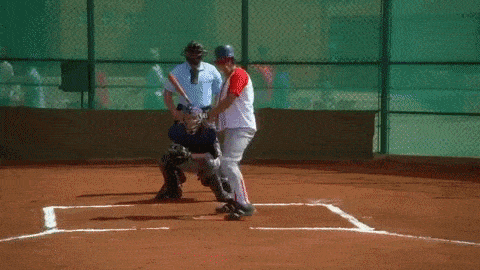
I will not be explaining the use of subtly in this essay, but I’m sure you get the metaphor Kenney is trying to use. If not, let me spell it out for you in very simple words. This song has a lot of sexual innuendos (as mentioned pervious with the baseball bat scene and still, more to come), with that in mind, and clearly queer themes at play (as mentioned before, again), this scene only shows Chad isn’t as straight as he leads on. His fear/phobia of Ryan/the arts come from a much deeper place.
In shorter, and much simpler terms: Chad queer.
But, let’s get back to the boy's conversation.
I don't dance - Ch
I know you can - R
Not a chance, no - Ch
If I could do this, well, you could do that - R
Translation: “If I can do this weird, sweaty, dirty, Male thing without blowing a fuse, you can and should be able to dance just fine.”
But I don't dance - Ch
Hit it out of the park - Both
I don't dance - Ch
I say you can - R
There's not a chance, oh - Ch
Slide home, you score, swingin on the dance floor - Both
I don't dance, no - Ch (This is just the chores, you’ll see it multiple times throughout the essay, I just figured if the song is going to be in your head, go all the way right).
Two-steppin, now you're up to bat - R
Bases loaded, do your dance - R
Here we are with the baseball metaphors you’ve all been waiting for ladies and gentlemen. Girls, gays, and non-binary pals. For those who have somehow managed a sheltered existence with access to the internet, lemme help you. Ryan is talking about “loaded bases” both in the context of the game (where it shows each base has one person from Chad’s team on them) and in the term of sex. While you go out there dating - while it’s mostly douche bags and people using it ironically - your nosey friends may ask you how far you got.
“First, second, or third base?” They may ask. Or something like, “oh wow, did you get to home plate/base?” These are simply the rankings of the stages of a sexual relationship. First - kissing, sometimes just handholding, Second - making out, some light groping, Third - full on groping, no clothes come off, but it gets close. While each person has different boundaries, these are the general accepted definitions for the bases.
Home base is obviously full blown sexual intercourse. Since Chad has his “bases loaded” it means he’s done all these things before, just never gone completely to sexual intercourse with someone - in the terms of the song and the history we’ve already established, it’s most likely a male character. This is only proven by Chad’s uncomfortable nature towards Ryan (internalized Homophobia, thank you, returning theme) but his easy, and cocky personality towards everyone else. “bUt thAt DoEsnT pRovE” hush, that’s the final cherry on top. Remember this conversation.
It's easy - R
Again. Previous points have been made.
Take your best shot, just hit it - Ch
I've got what it takes, playin my game - Ch
So you better spin that pitch - Ch
You're gonna throw me, yeah - Ch
I'll show you how I swing - Ch
Ah, the famous “I’ll show you how i swing” a very strong baseball metaphor for everyone. Keeps queer people from defining themselves to dangerous (straight) people, and, well, that’s it actually. This term is mostly used by bi/pan people, though if you want to stay in the closet or are in a dangerous place, it is also used to subtly tell other queer people you are in fact, not straight. My favourite is when this term came into play when President Buchanan got elected in 1856 (for those that don’t know, he’s the first and only gay president).
You'll never know - R
Oh I know - Ch
If you never try - R
There's just one little thing - Ch
That stops me every time, yeah - Ch
This is again, the same lyric as before it doesn’t pan, and the tone is much different. The camera stays on Chad as he says this line, meaning he’s reflecting, he is now his own problem, the person that is keeping him back. His friends are not on his mind anymore, which is good, Ryan’s Gay Propaganda has been working.
Come on - Ch
I don't dance - Ch
I know you can - R
Not a chance, no, no - Ch
If I could do this, well, you could do that - R
But I don't dance - Ch
Hit it out of the park - R
I don't dance - Ch
I say you can - R
There's not a chance, oh no - Ch
Slide home, you score, swingin on the dance floor - Both
I don't dance, no - Ch
Lean back, tuck it in, take a chance - R
Swing it out, spin around, do the dance - R
I wanna play ball, not dance hall - Ch
I'm makin a triple, not a curtain cal - Chl
I can prove it to you til you know it's true - R
'Cause I can swing it, I can bring it to the diamond too - R
You're talkin a lot, show me what you got - Ch
Again, like the beginning of this song, this is a heavy base for flirting and sexual tension, which this song is drowning in.
Stop swinging - both
Hey - both
This is the part where they all start a flash mob in the middle of the baseball diamond. Again, alluding to the conversation I had to myself earlier, this only proves my own theory as no one takes notice of this. But, that’s not this essay, this is where I mention how close Chad and Ryan are at the end of the group dance.
Come on, swing it like this - both
Oh, swing - both
Jitterbug, just like that - both
That's what I mean, that's how you swing - both
You make a good pitch but I don't believe - both
Here is yet another (and the final) sexual innuendo. This is actually a rather quick one. Pitching in queer culture is considered the person who tops (because queer people even had to straight-ify their sex lives to “top” and “bottom”), this is the person who is giving, if you know what I’m saying.
I say you can - R
I know I can't - Ch
I don't dance - Ch
You can do it - R
I don't dance, no - Ch
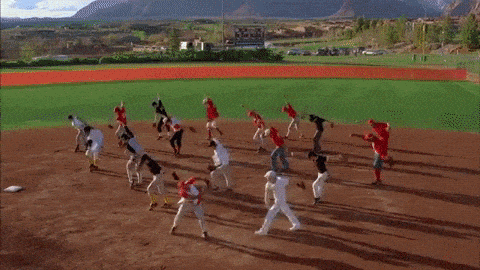
Here is where that mosh pit ends, and how they get a little too close to comfort.
Nothing to it, atta boy, atta boy, yeah - both
The rest of this song is simply a mash-up of the baseball game being finished, and this lovely gem.
Now, clearly, Chad’s self conscious nature towards his sexuality is gone, he’s sitting close - if not squishing - Ryan, and talking to him like they’ve been friends forever. Take note of the change of close, most likely due to all the tension at the end of the song, and maybe a little of Chad’s own natural human curiosity built in. Now, I leave you with this note:
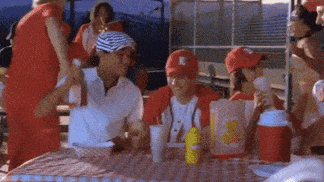
If there is anything that confirms all this more, its Chad’s girlfriend wearing the pride colours.
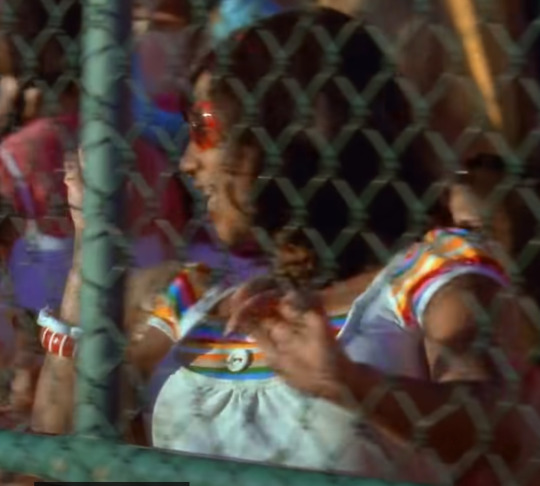
Also note: this could also be seen as a friend helping his bro discover his sexuality and fighting internalized homophobia, but, that’s ignoring the sexual tension, so go off I guess.
Thank you for coming to my TED talk.
Watch the full thing here
#high school musical 2#ryan and chad#do they have a ship name?#troy bolton#high school musical#the original not the remake or whatever the kids have now#ryan evans#chad danforth#Sharpay evans#troy x gabriella#ryan/chad#that baseball scene#yall know what i'm talking about#i don't dance#the gayest scene ever#and gayest song#Anyways: the series#should I write that second essay?#thanks for coming to my ted talk
249 notes
·
View notes
Text
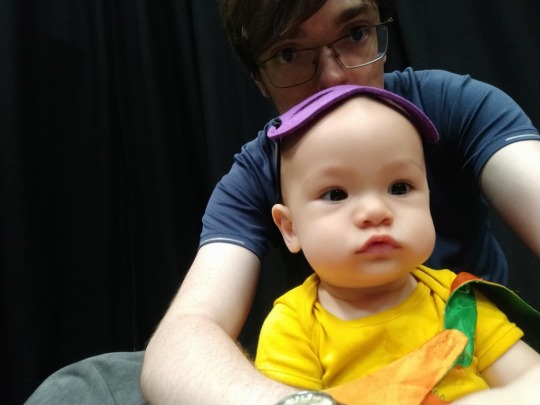
It occurred to me recently that I haven’t posted here for about nine months, and that if you knew nothing about me except for this blog, you might think that it something of a cliffhanger that I ended it on a post about expecting the arrival of my first child. (Or perhaps that would have been an entirely fitting way to end it.) Either way: I am fine, and we are fine, and last November brought the arrival of my son Robin into my life. I have been very busy almost every day since.
There are a couple of cliches about parenting that remain indisputably true. The first is that they grow up so fast. And the second is that nothing prepares you for it. We thought we were entirely ready and pretty well informed but from his delivery onwards nothing went as planned. We thought we’d feed him when he was hungry, and we’d put him to sleep when he was tired; and change his nappies, and play with him, and love him; and what else was there to it, really?
It turns out there is a lot more to it than that. Before Robin I never realised how polarised, how strained and how political people’s feelings are about matters of childcare. We’ve ended up raising him in ways we had never previously considered, partly out of necessity, and partly out of the kind of habits that grow into paths of desire across the days. Consciously or not I judge people who do things differently, and no doubt they judge me too. In spite of the reams of available literature it turns out that for many things — perhaps even most things — there isn’t necessarily a right or a wrong way to proceed.
Here is a third cliche that turns out to be extremely valuable: every baby is different.

The question of literature is a tricky one. In search of assistance I read a few parenting manuals; some of these turned out to be better than others, but I’ve yet to find a good book about what it means to be a father. Most books aimed at new dads are of the ‘pull your socks up’ variety — the kind of thing where the author imagined it thrust upon some feckless deadbeat by a weary spouse. But, being reasonably conscientious, and looking for something with a bit more depth than a guide to how to change nappies, I’ve found most books about parenting have little of interest to say to new fathers.
Being a dad is an odd thing to write about. I’ve read and heard people talk about how new mothers ought to be proud to be joining a kind of grand universal maternal tradition, one which predates even humanity itself. (Animals surely know about babies; witness my cat Louie’s endless patience with Robin’s various attempts to pull his ears off.)

People do not generally talk about the grand traditions of fatherhood in this way. And for good reason: a lot of men today wouldn’t be happy to follow the example of their own fathers, let alone imitate the conditions of detachment and distance that defined fatherhood for centuries. I want to say that expectations of fathers today have never been higher; but this is only because for most of recorded history, we had no expectations of fathers at all. In the space of perhaps two or three generations we have gone from the idea that a father should only have to provide for a child’s upkeep (and not slap them around too much) to a very immediate understanding of dadhood as a central plank of parenthood.
Perhaps a lot of this speaks more to my own insecurities than it does to anyone else’s. Still, I feel like there’s an easy camaraderie between mothers that isn’t apparent between fathers. My wife has developed a little circle of local mums with whom she’s in constant communication, whereas the WhatsApp group we created for the fathers in our NCT group has languished in silence. I don’t really have anyone with whom to compare notes. And what would we say if I did?
The pandemic has put us in an unusual situation. Ordinarily I would have had two weeks’ paid paternity leave, plus any holiday time taken alongside that. So I took three weeks off work — but I’m still working from home every day, as I have been since March 2020. This means that instead of watching me disappear to work five days a week, my son has spent every day of his life together so far with both his parents. I don’t even know where to begin with writing about the way this has changed us; perhaps I won’t know how to talk about it until it comes to an end.
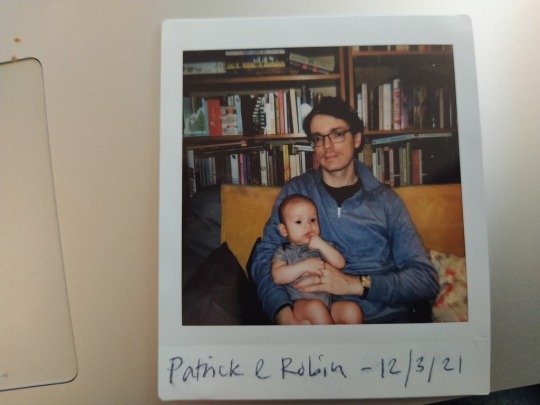
It does mean that parenting feels like it has consumed my life in ways that might not have otherwise been the case. Being at home for so long with a new baby was a remarkable opportunity, and in the early days — through winter and the Christmas lockdown — it didn’t feel like I was missing out on much. Things are a little different now. Every absence independent from my family feels like it requires a negotiation as much with myself as with anyone else. And I don’t only mean literal absences. Someone new has come into my life and they have no tolerance for anything else that might be meaningful to me. So many of the things against which I used to define myself have necessarily had to be neglected.
It goes without saying that I haven’t written much. Whatever free time I have at the moment is normally spent collapsed in an exhausted heap on the sofa, watching TV. I can count the number of books I’ve actually finished in the last eight months on one hand; I have started and set aside perhaps two dozen. I feel very remote from the person who spent several years documenting here every book he finished.
Games have fared a little better. In the early days, when I found myself with some late night hours to myself, I picked up the remastered Bioshock collection. It took me months, but I eventually finished all three: the first game is a masterpiece, the second is a very decent sequel, and the third is probably the greatest missed opportunity in all of gaming. (I ended up writing several thousands of words about the games, over the course of weeks — the only thing of substance I’ve written since Robin was born, in fact — which I since abandoned, in a fit of self-doubt and impatience with my own tortuous style.)
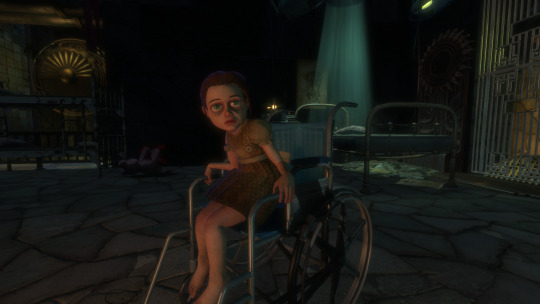
But I mean it when I say that the first game is a masterpiece. I had forgotten just how immensely absorbing it is — a journey into another world that’s less realistic than it is gloriously theatrical. Every time I think about it I feel like I want to replay it again. And it never really occurred to me before that Bioshock is about parenting as much as it is a picture of Objectivism in decay. It hits different now, as the kids say.
While driving over the weekend I passed the word ‘DADDY’ outlined in rich pink flowers, laid in memorial at the centre of a roundabout. It made me flinch. Every time I see that word in whatever context it seems to come with an intimation of departure. And in the same way every time I think about this game it seems laden with the feeling of a dying fall that nobody ever really seems to talk about. You play as a kind of genetically modified clone, returning home to his unwelcoming father and near-absent mother in a demented inversion of the Odysseus tale; and the only good you can do in this world is to rescue the handful of innocents left within it. You have to become a father yourself, in a sense. But your days are numbered.
The ending of the original Bioshock is often written off as a bit of a joke. You fight a deliriously incongruous final boss, and then depending on your actions through the rest of the game, you get to see one of two final sequences. In the bad ending, the denizens of Rapture somehow steal a nuclear submarine, and it’s implied that something very bad follows. But the good ending has more to it than that. You return to the surface, and it’s implied that you adopt some of the Little Sisters you rescued down there as though they were your daughters. There’s a brief montage of scenes from an assortment of lives. A graduation. A marriage. A child reaching for a parent’s hand. And then a death bed. The hands of your daughters reach out for you one last time.
After perhaps twenty hours of gameplay this sequence is perhaps less than a minute long. It feels rushed, awkward, sentimental. But as a coda, it also has the outstanding benefit of being perfectly real.
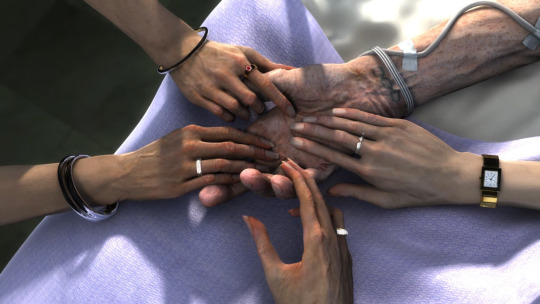
22 notes
·
View notes
Text
TerraMythos' 2020 Reading Challenge - Book 26 of 26
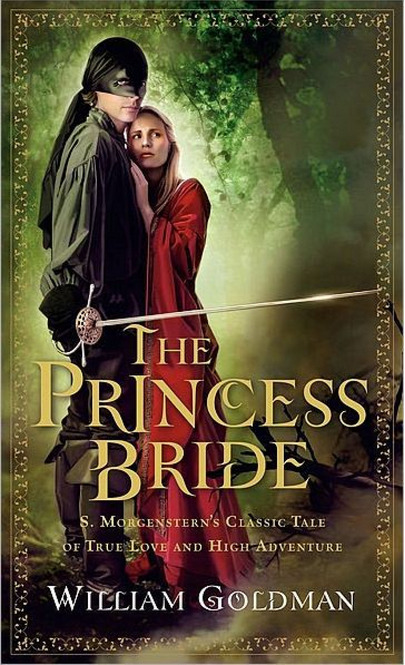
Title: The Princess Bride (1973, 1998/2003 reprint)
Author: William Goldman
Genre/Tags: Fantasy, Adventure, Comedy, Romance, First-Person, Third-Person
Rating: 9/10
Date Began: 9/14/2020
Date Finished: 9/25/2020
Young Buttercup has found her one true love -- a farm boy named Westley. Westley leaves to seek his fortune so that the two can be happy. However, when she learns Westley’s ship was attacked by the Dread Pirate Roberts, a man who takes no prisoners, she knows he must be dead. Devastated, she vows to never love again. Despite being a commoner, her beauty catches the attention of the horrid Prince Humperdinck of Florin. Buttercup is soon forced into a loveless betrothal to the Prince.
Now a princess, Buttercup is kidnapped by three mysterious men-- the Sicilian criminal philosopher Vizzini, master swordsman Inigo Montoya, and Fezzik the gentle giant-- and learns the three plan to murder her and frame the neighboring country of Guilder. However, the group is tailed by a relentless, mysterious man in black, who seems like he will stop at nothing to catch them.
"Fool!” cried the hunchback. “You fell victim to one of the classic blunders. The most famous is ‘Never get involved in a land war in Asia,’ but only slightly less known is this: ‘Never go in against a Sicilian when death is on the line.’”
He was quite cheery until the iocane powder took effect.
Minor spoilers(?) under the cut.
Somehow, I've never read The Princess Bride. Considering I read a lot and have seen the classic movie maybe two dozen times, that seems like a gross oversight on my part. So I figured, why not cap off my reading goal for the year with a classic?
It's really hard to review this book without the context of the beloved 1987 film. If you've reached this point in your life and have not seen The Princess Bride, please close this review and go watch it-- if only for the pop culture clout you'll get from it. William Goldman wrote both the book and the screenplay, and the adaptation is alarmingly faithful to the source material. Almost every classic line from "inconceivable!" to "Hello, my name is Inigo Montoya, you killed my father, prepare to die" is lifted straight from the book. Aside from a few differences, the story beats are virtually the same. Reading this felt like watching an extended cut of the movie, and it's impossible for me to imagine book scenes without picturing the stellar film cast.
That's not to say they're identical pieces of media. Each has distinct advantages over the other. The Princess Bride novel is much more detailed. You learn more about supporting characters like Inigo Montoya and Fezzik and their backstories. Certain locations are different, such as the Pit of Despair actually being something more complicated/gruesome called the Zoo of Death. The written format also allows for some running jokes that are either absent or heavily modified in the film. For example, Goldman makes fun of the anachronistic nature of the story by referencing time in odd ways, like something taking place "after soup, but before Paris". Fezzik compulsively rhyming, a one-off joke in the movie, is a recurring gag in his narration. Stuff like that.
The frame story is also more complex, centered around a fictionalized version of the author (though many memorable beats from the movie's frame story are still there). The gimmick of the book is that William Goldman is adapting a "good parts version" of a classic historic fairy tale, based on what he remembers from his father reading it to him as a sick child. While I rarely see frame stories done well, Goldman utilizes his to really up the comedic value through constant editorial comments and asides. It mostly enhances the story, though the intro drags a bit, especially because it's longer in subsequent editions.
Where I think the movie shines compared to its source material is, unsurprisingly, the visual component. The sword fight choreography in the film is amazing, and while the novel makes a valiant effort, it just doesn't compare to seeing it performed. Ironically enough, I think the movie succeeds as a "good parts" version of the book by condensing the story in a satisfying way. While the book is inherently more detailed, I don't feel like anything big was lost in adaptation, just simplified or shifted around. This is so rare in film adaptations that I'm still shocked. Holes is the only other film that comes to mind that does this so well (though there’s probably other examples I’m just not aware of).
But how do I feel about the book itself? It's fun. It's set up like a fairy tale adventure story with a lot of tongue-in-cheek humor about the genre. If you like classic adventure stories with seriously memetic humor and memorable characters, it's hard to go wrong with The Princess Bride. Some tropes haven't aged super well, and I think a more modern take would be interesting, but for a 1973 novel it's pretty good. I don't have much more to say about it!
The 25th anniversary edition (1998 and onward) has some bonus stuff, mainly one chapter of a (fake?) sequel called "Buttercup's Baby". The frame story again has a super long, dragging intro. There is little to the actual story, just a few bonus scenes of what happened/may happen to the main characters after the main story. While I like some of the jokes and ideas, I'm not sure I really "get it". Did Goldman work on a sequel at one point and scrap it, and published this bit for the reprint? Am I missing a joke? No idea. There's an early joke that the full thing should be out by the 50th anniversary in 2023. Unfortunately, Goldman passed in 2018, so we'll probably never see that particular joke (or surprise publication) pay off. If I really, really had to pick between the movie and the book, I think I prefer the movie just a little more. It could be nostalgia, but I feel the movie has most of the book’s memorable writing with the excellent visual presentation and stellar cast. It's a perfect realization of the source material. What more could anyone want? But I'm glad I read the book for the nostalgia trip and extra insight into one of my favorite movies.
10 notes
·
View notes
Text
We Only Come Here To Sleep
A new Gobblepot fic cause I need to do something on the weekend.
Summary: Three infants have been murdered and their bodies have been found at various places in Gotham City. The public, as well as the mob, want to see a culprit for different reasons. After everything Jim Gordon has been through, one wouldn't think an ordinary case would take its toll on him. But it does.
Read the first chapter on Ao3 or here:
In the end, it wasn’t one of the Riddler’s elaborate schemes, or one of the Joker’s ludicrous plans. It wasn’t Bruce Wayne and his determination to become a vigilante, or even the Penguin and his golden empire of crime. In the end, it was a usual case, an ordinary crime that did James Gordon in.
Gotham City seems to know only two seasons. Through most of the year, there’s an icy wind sweeping through the city, biting into the grim faces of her inhabitants. Most of her days are dark, giving the impression of an endless night.
But then comes the summer. And for a few weeks, Gotham will be tinged with yellow. But it won’t be a bright summer showing off clear skies painting the city with gentle colors. No, it will be harsh and brutal - like everything in this godforsaken city.
The sun will be beating down, baking pavements and glass-facades until each breath in the overheated air will be painful, until each step will be a battle. And the light! It’s never a bright yellow, but a color reminiscent of piss. It suits this pain-filled place, though.
Jim Gordon curses under his breath as exists his car. When putting his feet on the ground, his soles practically fuse with the ground. A wave of hot air hits his chest, and Jim can instantly feel the sweat covering his chest, causing his shirt to cling uncomfortably to his upper-body. Reaching for his sunglasses, he gestures for Harvey to follow him.
The heavier man pulls a face when being ordered to leave the chilled cocoon of his car. Jim ignores him. Sighing heavily, he nods towards the other officers already crowding the scenery.
Despite the buzz, he feels alone. Out here, Gotham is at her worst. For miles and miles, there’s nothing to see but the grey of the concrete and colorless sand. It’s a place where people disappear in the filthy water never to return again. Jim is certain his colleagues will lay him to rest out here one day in the future - he wouldn’t blame them.
After taking a few more hesitant steps, Jim hears the sand crunching beneath his shoes. If he closed his eyes for a moment, he could easily pretend to be somewhere else. At a proper beach maybe, under a benevolent sky. Instead, he thinks how annoying it will be to get the sand out of his shoes.
“Where exactly are we?” Harvey asks with a slight growl, startling Jim.
Jim tilts his head. He contemplates giving his partner a snarky reply but thinks better of it. So instead of pointing out that he didn’t spend the car-ride blindfolded and handcuffed, he explains, “Common ground.”
Sucking in a shuddering breath, Harvey tilts his head. “That’s bad.”
Jim doesn’t reply, simply grits his teeth. ‘That’s bad’ doesn’t even start to cover how bad this could be.
One of the younger officers picks up on their conversation. Confusion written all over his face, he addresses Harvey. “What do you mean?” he asks.
Huffing out a humorless laugh, the experienced cop indulges the lad. “That’s the land between the turfs.” Pointing across the river, he elaborates, “That’s the Valeska turf.” He turns slightly to the right, “The Siren’s oasis.” Making a full turn, he points vaguely in the direction Jim is standing, “Tetch’s outdoor amusement park for the hopelessly lunatic, right beside the Scarecrow’s House of Horror.”
At last, he circles his partner fully. “The Narrows,” he says then, ignoring the slight pang of pain on Jim’s face deliberately. “None other than the Queen rules this shitty piece of the city.”
Taking a deep breath, he finishes his quick initiation to Gotham’s inofficial districts. “But they all pay their tribute to the Penguin.” Adjusting his sweat-sodden fedora, Bullock spits on the ground. “And this crap place? That’s no one’s ground. If a body is being dropped here , the rogues passed their judgment. Together.”
The young police-man gulps. He stares at Bullock and then back at the riverbank where the coroner is already busy taking samples. “So they…?”
Pushing the lad aside, Jim steps forward. “So if a body ends up here without permission here, that means the mob will interfere,” he states grimly.
Approaching the riverbank, the Commissioner finally takes a good look at the corpse before him. Despite all the horrors Jim had been through before, nothing could have been able to prepare him for the sight before him.
For a long moment, he merely stares, unmoving. He has seen corpses before, has been the cause of untimely deaths more times than he’d like to admit, but this is new.
No, in fact, it isn’t. Jim has been confronted with this kind of death before, has tried his very best to suppress that memory as best as he can, but given the context, this is new .
Looking up, he nods for the coroner to start elaborating. Never before has Jim missed the previous forensic, Edward Nygma, as much as this very second. For once, he wishes for someone to wrap up harsh truths in distracting riddles. Jim would give up his year’s salary and then some, if the forensic would give his mind an opportunity to wander off, to focus on something else than the task at hand.
What he gets, though, are simple facts. “Infant. Male. Probably not more than a couple of days old. Maybe not even that. Probably strangled. No severe trauma,” he rattles on, unfazed by the tiny body lying on the dirty ground. Maybe she hardens you to this point.
A baby. Just a little, innocent baby. Jim can hardly breathe as he stares down at what has been a living being, if only for a few hours. His skin is already peeling off due to the merciless heat, turning black and blue beneath Gotham’s sun. Jim wonders if it was rosy, once. He stares down, unable to look away, takes in the little knobs of fat on its upper arms and legs, and tries to suppress a sob.
Somebody should hold this little thing in their arms. It should still be alive, making happy noises, as one gently pinches those tiny rolls of fat. It should squeal with delight, and only cry if it’s hungry.
At last, Jim has to turn away. This is not right. Nobody should discard a child as if it was trash. Especially not here, at this godforsaken place.
His fingers itch to pick up the small body, to hold it, if only for a moment, the way it deserves. In another life, he would know exactly how to go about it. He and Lee would have awaited their child’s arrival with excitement. Would have picked out a crib, toys, rompers, and books, maybe. They would have laid in bed, Jim’s hand on Lee’s belly, waiting for their kid to move, knowing full-well it’s still shielded from this city, from her .
This reality never happened, though. Will probably never happen to Jim, for he doesn’t deserve such happiness, he knows that. But still. It’s unfair. This infant lies there on the ground, discarded like trash, and it’s everything someone like Jim has ever wished for.
He bends down, almost touches the tiny cheek before remembering he’s still a cop. Swallowing heavily, he disguises the motion by wiping the sweat from his forehead.
A heavy hand lands on his shoulder. “You alright, partner?” Harvey asks quietly enough that nobody else hears them.
Jim’s chest constricts, he has trouble taking a breath, and still, his jaw is set tight. Nobody but Harvey would ever catch on, would note that anything was wrong. Jim is thankful for the warm hand, the solid weight on his shoulder. He’s grounding him in his pain, forcing him back to reality, when all he wants to do is float away and wallow in his grief.
“Of course I am,” he replies, a tad bit too quickly.
Harvey arches an eyebrow at him, but doesn’t reply. This is neither the place nor the time anyway.
“Won’t you finally pack up the evidence?” he snaps when the coroner gives them both a look that is too curious for Harvey’s taste. The coroner squints in disdain, but does what he’s told. After all, Bullock has a natural authority to him, he’s a character only Jim questioned successfully so far, and today, he’s glad for it.
They get back into their car, where it’s cold and sterile and death is but a memory at a riverbank. He blinks as he tries to wrap his head around what he just saw: an entire life, wasted in the sand. Neither of them talks as Harvey drives back to the city, back to the living.
Finally, Harvey glances over at Jim, now and then beating nervously the devil’s tattoo on the steering wheel. “That’s the third,” he whispers.
“I know,” Jim replies. He’s too exhausted to say anything else. Over the course of the last three weeks, they found three dead infants. All scattered around the city. The first two had been siblings according to their DNA-analysis. Jim wouldn’t be surprised if the third one is related to them, too.
“You want me to drop you off at the weasel’s place?” Harvey asks, and Jim flinches.
“What am I supposed to do there?”
The other man shrugs. “We found it on Common Ground.”
Jim hums in agreement. “Doesn’t look like a mob-job, though.”
Tilting his head, Harvey acknowledges the statement. “He could still know something,” he states petulantly and both men know he’s reaching for straws there.
“This case is getting to you,” he adds after a moment. Jim rolls his eyes but can’t find it in him to disagree. “You could at least get a free drink.”
The blonde snorts. “I think I’m outta favors.”
Harvey scratches his chin. “Still. Maybe one of his goons has seen something.” He clears his throat, looks over at Jim. “And it wouldn’t hurt for you to let off some steam. You always seem to be better off after pushing the Penguin around for a while.”
Jim sputters. “That’s not true!” he protests.
Holding up his hand, Harvey interrupts him. “It is. Go there. See what he knows, rough him up, arrest one or two thugs. You’ll feel better.”
Horrified, Jim stares at his partner’s face. “You make it sound like I’m harassing an innocent citizen for nothing. You’re still aware we’re talking about the Penguin?”
Harvey snorts in response. “That’s exactly why I’m suggesting.” He clicks his tongue against his teeth. “Not accusing , just to be clear.”
Jim falls silent as he clenches his fists. He’s so damn tired, he doesn’t even want to put up a fight.
“He’ll find out anyway,” he demurs. “And he’ll want answers. You don’t simply drop off a body at the riverbank and expect Cobblepot to keep his hooked nose outta your business.”
“This is a police investigation,” Jim snaps back, unfazed, and Harvey’s jaw drops.
“Even after becoming the Commissioner, you still sound like a petulant rookie on some days.
Leaning back against the seat, Jim closes his eyes. Even before today, he had been exhausted to the point of not being able to sleep properly for weeks. This city just won’t let him.
And now there’s a body on Common Ground.
This city doesn’t seem to rest when it comes to her sinisterness. If Gotham doesn’t want to swallow her entire population whole, she now goes for her most vulnerable inhabitants. Jim wishes he could for once simply search for stolen paintings or chase a burglar. But no, there’s always something bigger, or something more diabolical lurking in the shadows.
Jim’s shoulders slump as he gives in. “Let’s do the paperwork first,” he suggests, cause he’s still the commissioner. “And then we’ll inform the Penguin like the good, little cops we are.”
10 notes
·
View notes
Text
300, and other random observations
Last night Mel and I were scouring the episode looking for the expected obvious “300″ to jump out from some random door or building number, or appear SOMEWHERE in the episode the way 100 did in 5.18:
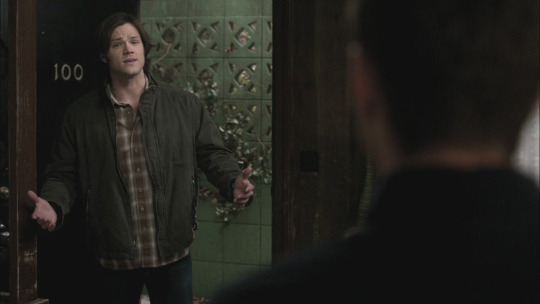
or 200 did in 10.05:

In case it isn’t obvious from this image, this is the 200 Motel:
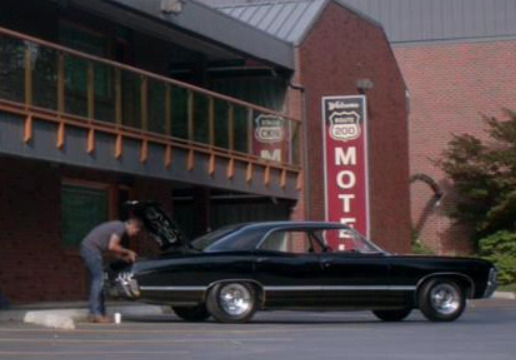
So I was looking for the 300 in 14.13, and weirdly didn’t find anything quite this obvious. I rambled a bit about my search here on @drsilverfish;s post:
http://mittensmorgul.tumblr.com/post/182669346730/14x13-lebanon-some-silent-storytelling-notes-on
But I saw some interesting things in the pawn shop and around Lebanon that I can appreciate, as well as some very well hidden “300″ references. Basically this is just my Jerry Wanek appreciation post, because what a guy!
All screencaps are from hotn.
The one thing I’d overlooked as a HUGE “300″ is the most prominently featured guitar in the shop:
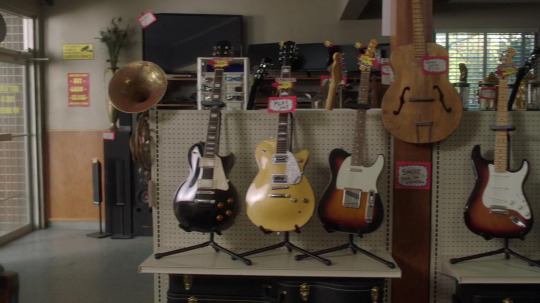
That one right in the middle, raised up above the others, looks a bit downtrodden. It’s missing its strings, first off. While another guitar is labeled “PLAY ME!” this one isn’t playable at all. And yet it might be the rarest instrument in the shop, and with a bit of tlc could easily be worth thousands. It’s a ww2 era Gibson ES300. Between 1942 and 1946, Gibson only produced a few acoustic guitars, since metals for the electric pickups were needed for the war effort. I think this could be one of those guitars. So talk about a big, blaring 300. Unstrung, a product of war, seemingly unplayable, but with care and attention, possibly the most valuable and precious instrument in the shop. Easy to see why it’s given pride of place.
But again, this isn’t an obvious 300. You kinda have to know something about something to even recognize it among all the other second-hand guitars.
(also lol at the giant tv in the background that makes us think of 13.16)
(and lol at the tuba that makes me think of the house of horns or whatever from 6.06. This show has such a bizarre history with pawn shops...)
Under a cut because this got way longer and more rambly and tangential than I intended >.>
There’s a lot going on just at the register:
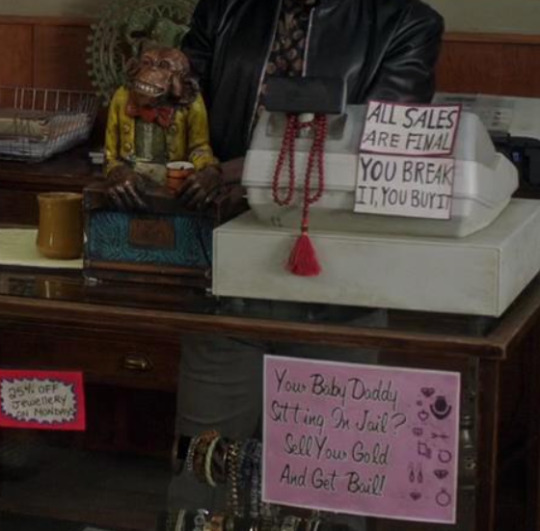
Roadhouse Monkey, “You break it, you buy it,” and the sign that says “Your baby daddy sitting in jail? Sell your gold and get bail!” with the weirdest assortment of random jewelry pictured on it... and oddly a mala draped around the register itself. Clearly this dude hasn’t been using his mala for meditation practice.
In the post I linked above, I already described their entrance into the secret back room, where everything was “one of a kind” and we immediately saw two identical goblets. Go read that post for more on that. :D

Behind the goblets, it almost looks like a heart frozen in a block of something. But what the shop owner points to is a Hand of Glory, which was the central magical item from 3.06, the plot of which had to do with people who committed acts of violence against family (and the spell they found to banish the ghost killing people forever contained the first use of the word “Castiel” on the show).
He goes on to point out “gris gris bags” and “anointed dove’s blood.” Gris gris bags are protective talismans, which my brain immediately associates with Gordon Walker. He traded his to Bela for the Winchesters’ location in 3.07, and after giving it up, he was turned into a vampire and then killed by Sam. I can’t remember any use for the dove’s blood in canon...
It’s hard to see, but one shelf over is a Jason Voorhees style hockey mask (which is interesting to me because of 14.04 and the horror movie callbacks that were referenced later in 14.13 again at the movie theater in Lebanon playing All Saint’s Day and Hell Hazers). Not to mention as we talked about during 14.04, the original “monster” they were supposed to fight with in 3.10 in their nightmares was Jason, but Kripke didn’t realize they couldn’t obtain the rights to it, so that scene had to be cut. So in a roundabout way we get another reference to that iconic scene between Dean and his demon self, rejecting John’s influence over him. Beside the mask is the first of three Centurion Helmets we see in the episode (actually the second instance is probably this helmet again, but in a different context, in the box the teens steal from the Impala and take into their party house, along with the teddy bear Sam plays with here in a minute).
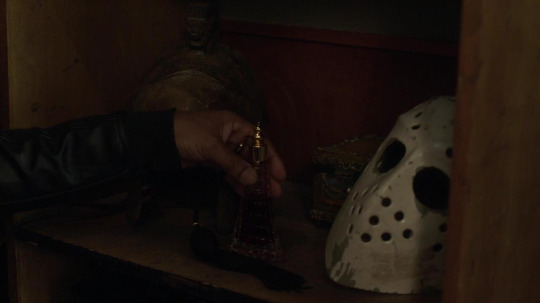
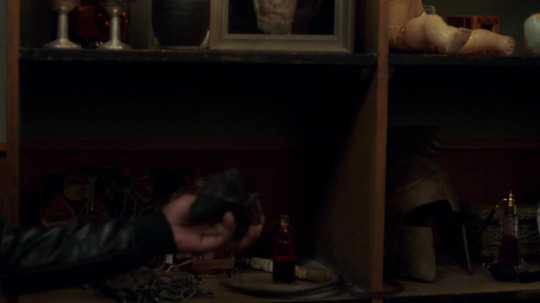
There’s the spray bottle of Dragon’s Breath, that looks like an innocent bottle of perfume with the squeezy bulb, but shoots out a gout of fire.
Inside his safe, along with the skull of Sarah Goode, executed during the Salem Witch Trials, is an odd assortment of things, double-locked inside this already secret room:
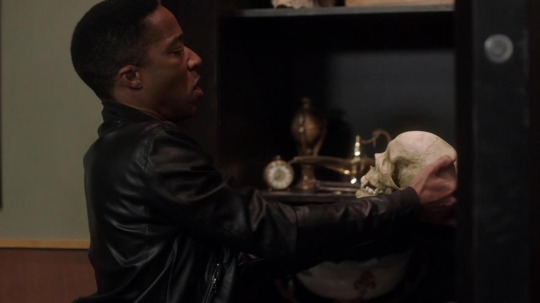
It looks like a clock of some sort, a brass globe, and a genie’s oil lamp. But it’s the fact he had the skull at all, stolen from a murdered hunter that they knew, meant that he’d been involved with that horrific crime, like the previous references to Bela who traded in these artifacts (and had sold the hand of glory when she’d needed to destroy it to save her own life... I mean this was pretty heavy Bela parallels here), the owner turns the Dragon’s breath on them and pulls out a saber:
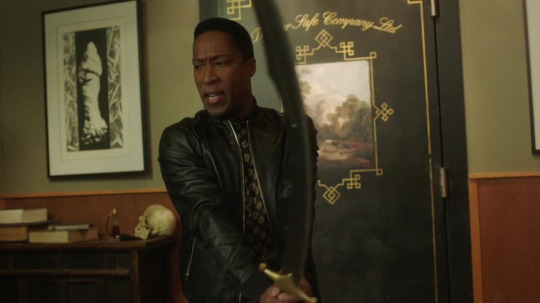
It’s called “Chrysaor.” Whether the one from Spenser’s “The Faerie Queene” that belonged to Sir Artegal, the Knight of Justice, and had supposedly been used by Zeus to battle the Titans, or to the offspring of Poseidon and Medusa and the brother of Pegasus, or whether it was a nod to Assassin’s Creed (I honestly think it’s the former and the latter is a bonus here...)
This reminded me SO MUCH of Gog and Magog and their Special Swords forged by a god, with the reference back to Zeus and the Titans here, AND to the actual circumstances around how Dean managed to kill them. Because Gog and Magog... just would not shut up. Dean even lampshades the fact this guy stood there with the sword over his head, raised above Sam sprawled on the ground the same way Cas was in 13.14:
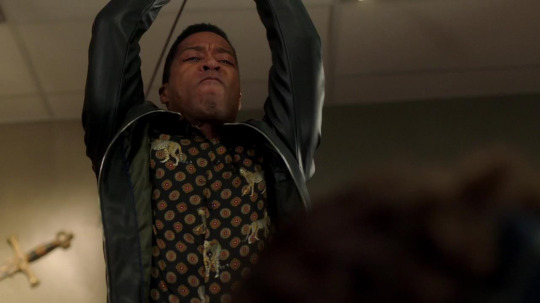
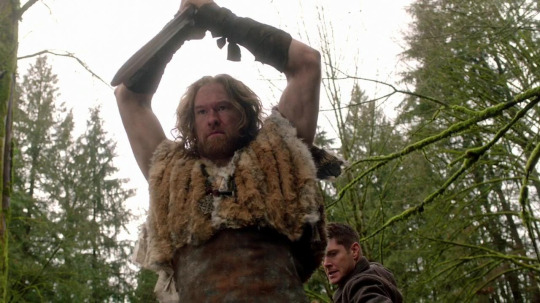
But he talked long enough about Cas’s “beautiful death” that Dean was able to stab him from behind, just as he was able to shoot the store owner now, because he wouldn’t stop talking. Forged by a god, touched by God...
Then we see the store’s secret ledger:
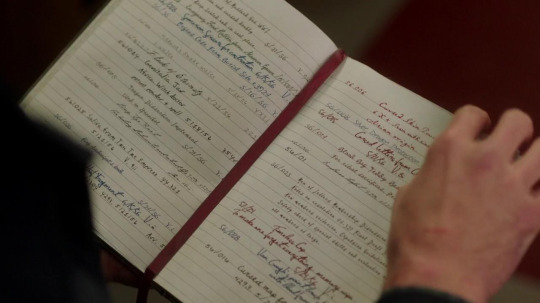
I honestly don’t want to know what’s in the “genitalia jar.” But these entries are dated from 1956. How long has this shop been into this sort of shady business? At least as far back as the original MoL was operating in the US (they were annihilated in 1958 by Abaddon). And there’s even a reference to a “Men of Letters membership discussion” in the ledger:
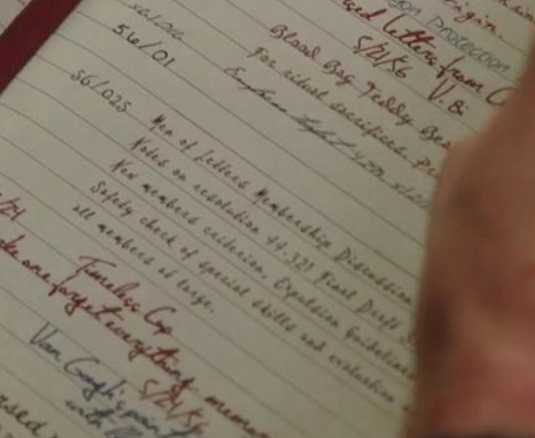
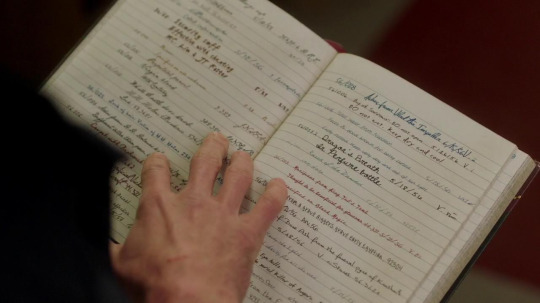
Of interest on the next page is a lock of hair from a victim of HH Holmes (taking us back to 2.06), as well as trinkets associated with Vlad the Impaler and Napoleon, a “bag of sorrows,” and a “razor of the damned.” Among other items of interest.
But here’s the page with the magical pearl:


And nowhere in this book does it say the pearl “gives you what your heart desires.” It says, “a pearl that grants wishes.” So... where did Sam get that additional information? I find it fascinating how things that are written in books are interpreted in a much broader fashion by the reader-- first Dean with the book Billie gave him in 14.10, and now Sam with this entry in this ledger.
Because this has been happening a lot.
For example in the scene immediately prior to this, the kids outside are talking about the Winchesters when they actually drive up. Their conversation is really interesting:
Eliot: People say they’re brothers. All I know is I was standing right here when-- when I heard this BAM! from the trunk of their car. And then, this like, shallow breathing. Max: No way. Flower Shirt Girl: Eliot, you’re creeping Max out.
I have to assume this was when they still had Garth in the trunk of the car, and just :’). Eliot is making some assumptions, but he’s much more terrifyingly accurate than he probably could guess. And Max’s flippant comment in her next scene proves it:
Eliot: I mean think about it. Where do they even come from? Them or their weird sidekick with the trenchcoat. Or what about the kid with the dumb Bambi look on his face all the time? Max: So what, it doesn’t mean they kidnapped Bigfoot or whatever.
And they all laugh, and Eliot calls them dicks. :P
And all of this makes me think of how the show spent the early part of the season teaching us how to read between the lines, to fill in narrative gaps, and to parse the subtext to understand exactly what it was they were actively not showing us.
Like in the scene at the party house where the John Wayne Gacy clown appears, we don’t see Dean thrown by the clown (just as we didn’t see the other boy who was attacked escape from the clown), nor do we see Sam light the fire that burned the cigar box tethering the ghost. But it’s clear that Dean was thrown because we saw him land, and Sam obviously eventually got his lighter to work because there’s the evidence of the flames.
Also, did they bring that old pickup truck from the bunker? Because they should DEFINITELY drive that thing more often. :’)
And Eliot follows his instincts, wanting to know what’s up and witnesses the ghost going up in flames. And he knows what he saw, and doesn’t even question it. When Sam confirms it, he feels so validated. Just like us when we read the subtext and fill in the blanks.
I have no idea how I got here from rambling about finding the 300′s in the episode but here we are.
OH. Right! The Centurion Helmets!
The first we see was in the shop pictured above. We see it again at the Party House in the Establishing Shot inside, nestled in a box with Sarah Goode’s skull, which was the original Macguffin that led Sam and Dean to that pawn shop in the first place, which enabled them to find the pearl to even be able to make this wish at all:
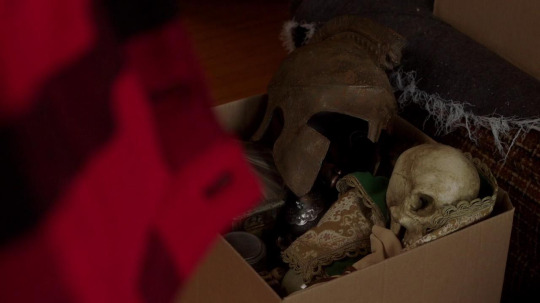
And the second and third Centurions are on the wall of B&E Pizza:

(and the one on the other side of the menu board hasn’t been screencapped yet, but is much more clearly visible than this one because Cas lights it up:
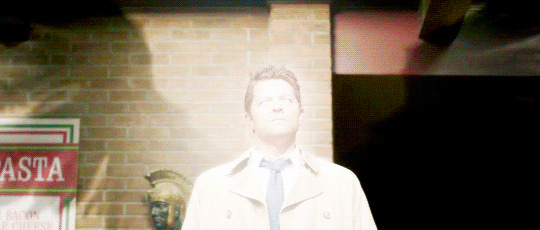
Three Centurions. Each of whom commands a century, or a group of 100 soldiers. So I’m going to use the fact that the show is actively telling us to notice and read between the lines, and assume we’re seeing yet another 300.
Especially after Misha’s tweet joking about it: https://twitter.com/mishacollins/status/1093606706532282371
#spn s14 spoilers#spn 14.13#spn 300#this is a jerry wanek appreciation blog#but this is like... borderline lamp crack levels of appreciation here...#spn 13.14#spn 6.06#spn 6.07#spn 5.18#spn 13.16#spn 10.04#spn 2.06#spn 8.12#spn 11.05#spn 14.04#the roadhouse monkey#wherein mittens thinks out loud to the general dismay of her followers#this is actually a rambling nightmare of a mess but hey i got like 3 hours of sleep last night so whatever#read at your own risk i guess lol#spn 3.10
187 notes
·
View notes
Text
How Do You Solve a Problem Like Jessica?
@timeless-season-three is returning in just about a week, on Jan 13 8/7 central, and with it returns one of the most complex characters on the show: Jessica Logan.
Note: I wrote this while operating on like three hours of sleep so forgive any incoherence.
Jessica starts out on the show as Wyatt Logan’s deceased wife. She’s been dead for six years at the start of the show, only to return in 2x03 Hollywoodland, somehow brought back to life by Rittenhouse for unknown purposes. In the season two finale, it’s revealed that she is a) working for Rittenhouse and was in fact raised by them after they went back in time and saved her brother’s life as as child and b) pregnant with Wyatt’s baby.
Yeah, it’s a lot.
Now, the Timeless writers have written themselves into a bit of a cliché with Jessica working for Rittenhouse, but fortunately, there’s still a lot to work with here with such a character in the right hands.
So. How does one take the problem of Jessica Logan and make sure she’s a three-dimensional character and not a one-note paper-thin ‘always evil’ villain who was lying about her pregnancy and sacrificed in a hack job to make room for the ‘main ship’?
Well, you read timeless-season-three and don’t watch that fake movie I hear is floating around.
Jessica Logan is the latest in a long line of dead wives and the latest in a long line of ‘evil’ exes. Two overused tropes under her belt, damn. Overachiever. This presents her writers with an interesting problem to overcome.
Luckily, the timeless-season-three writers have done our girl justice by remembering something vital that many people tend to forget about Rittenhouse:
It’s a cult.
Now, straight white men like Nicholas Keynes, Benjamin Cahill, John and David Rittenhouse, and Michael Temple (may he soon rest in pieces) have no problem buying into this ‘society’. To them, Rittenhouse probably feels like a slightly more organized and exclusive version of the conservative movement. But how do otherwise brilliant and educated women like Emma Whitmore and Carol Preston buy into it? How do gay men like Ethan Cahill stay in it?
Lucy’s treatment in between seasons one and two is the biggest tip off to this. She spends weeks being held prisoner and indoctrinated by her mother, undergoing ‘training’ and she flatly calls Rittenhouse a cult that tried to brainwash her in 2x04 to Flynn and Rufus in Salem.
Lucy is fortunate—despite her tendency to let people walk all over her, she is a woman of strong opinions and convictions. She’s also an adult when her mother tries to indoctrinate her. She resists the Rittenhouse ‘training’.
But Jess watched her brother saved by a miracle and was then raised in this cult. A cult that placed her in a position where she was in a dead-end job, married to a possessive and jealous man (even if Jess is lying about Wyatt’s drinking problem and cheating on her, we’ve seen in the original timeline by Wyatt’s behavior and own admission and from Lucy’s journal that he was a jealous husband whose jealousy lead directly to Jess’s death). In short they put her in a life where she would have literally no one to turn to besides Rittenhouse, keeping her under their control.
@timeless-season-three took the problem of Jess’s character setup and has used it to set her up perfectly for a redemption arc. And they did it by running with the context clues set up in season two.
First: Jess tries to divorce Wyatt in 2x04. He pleads with her that he’s changed and between his pleading and Lucy’s later on in 2x05, Jess agrees to give Wyatt another chance. However, Jess as a Rittenhouse agent had no way of knowing Wyatt wouldn’t sign those papers. She especially had no way of knowing Lucy would plead with her to give Wyatt another chance. Lucy’s a better person than 90% of the people I know—how many of us would genuinely give up the man we have feelings for, who clearly has feelings for us, for the wife who wants to give him up? It makes so much more sense for Jess to be genuine in wanting to walk way from Wyatt. Especially if she doesn’t realize how ruthless Rittenhouse is (more on this in a moment).
Second: Jess is in the bunker for at least a month. She could have shot Wyatt in his sleep and stolen the Lifeboat at any moment, and probably should have the minute she got into that bunker. It makes no sense for her to stay as long as she did. Even if she’s gathering intel, it’s easier to just plant a bug for Rittenhouse, then grab Rufus or Jiya and force them onto the Lifeboat.
Instead, Jess spends a month hanging out. She watches reality TV with Jiya (and most likely Lucy since Lucy admits to Rufus that she herself watches ‘very bad for you but delicious television’). She let the MASSIVE clue drop that her brother is the reason she’s Rittenhouse (she knows Rittenhouse saved her brother, therefore she knows that Wyatt wouldn’t know him since he’s from a different timeline and has said as much). She doesn’t kill Wyatt, Rufus, Mason, or Lucy and Flynn (Lucy’s not sleeping on the couch and therefore must be bunking out in Flynn’s room again) when she steals Jiya and the Lifeboat. They’re all asleep and she grabbed Wyatt’s gun—killing any of them, especially Wyatt, would have been a piece of cake.
But she doesn’t. She hangs out in that bunker killing no one for no reason.
Third: The pregnancy. Now, I personally thought it was a lie blurted out to distract Wyatt from investigating his suspicions about Jess’s brother. But as of 2x10 she’s assured Wyatt she’s truly pregnant and that it’s his child—and that furthermore she loves him and doesn’t want to do this.
Does any of this sound like someone else we know?
If you said, “Ethan Cahill,” then ding ding ding! You’re right!
Jessica Logan is on the surface a writing problem. She’s a massive trope. But we also have the seeds of something so much deeper, and it looks like timeless-season-three is taking those seeds and helping them bloom.
In season three it’s established right away through an interrogation scene between Jess and Emma that Emma has no problem killing Jess and Jess’s unborn child. When Jess tries to make a friendly overture, offering to make Emma dinner, Emma mocks her and shuts her down. In 3x04, Jess is sent on a mission with a bug in her brooch (unknown to her) so that Emma will have proof of Jess’s loyalty. Jess’s life is threatened, directly and indirectly, multiple times. In season three, in short, she’s used to highlight how Rittenhouse bullies its agents.
We also see through Jess’s own behavior that she’s reluctant and unsure about Rittenhouse’s methods and her own role. She expresses dismay when Emma says everyone on the time team will be killed. She waits weeks to give up the location of the bunker. And when she runs into Wyatt she can’t kill him and in fact tries to warn him about the impending earthquake in 3x07.
All of this brilliantly parallels Ethan Cahill. A closeted gay man, Cahill nevertheless stays in Rittenhouse to protect his wife and son and because he sees no other option. It’s only with the persuasion of Lucy and his love for her as his granddaughter that he agrees to be a double agent.
That’s right. A double agent.
While we of course don’t know what’s in store next for timeless-season-three other than tears and screaming, Jessica is currently being set up to become what Ethan Cahill was: a double agent within Rittenhouse. Jess has experience with this being undercover at the bunker, and she’s got a compelling reason to turn other than her love fo Wyatt and affection for the time team: her child.
The timing of Jess’s defection to Rittenhouse is interesting. It comes almost immediately after her announcement that she’s pregnant. If she’s been reluctant to turn the team in, her pregnancy could be what made her steal the Lifeboat—she feared what Rittenhouse would do to her unborn child (through her) if she changed sides. Now, her pregnancy could be a good catalyst to getting Jess to switch sides again, to keep Rittenhouse from raising and brainwashing her child as they did her.
Furthermore, Jessica (as mentioned a few paragraphs ago) could have not known just how bad Rittenhouse was. She could have truly believed it was a force for good, or at least not as black and white as the time team claimed. But in spending time with the team, she could have come to realize just how bad Rittenhouse was. Once you’re out of the cult, it’s easier to see the toxic behavior. And now the full brunt of Rittenhouse ruthlessness is being unleashed on her and she’s realizing how trapped she is.
But again: Rittenhouse raised her. How do you turn your back on your family?
Rittenhouse raised and manipulated Jess. They’ve put her life and her child’s life in danger. The push-pull between those two loyalties makes for a compelling character arc, and timeless-season-three is playing that to the hilt.
By taking the context clues into account and remembering Ethan Cahill, timeless-season-three has taken the problem of Jessica Logan and the tropes she represents and is presenting us with an equation for a successfully three-dimensional character with a storyline all her own.
I, personally, can’t wait to see timeless-season-three’s final solution to the unique problem of Jessica Logan.
#timeless#timeless s3#timeless-season-three#timeless meta#jessica logan#Jessica Logan Defense Squad#okay let's be honest this didn't turn out as well as I wanted it to#I'm probably not saying anything as well or as articulately as I should#I should probably have more quotes and episode receipts#alas#I am tired
19 notes
·
View notes
Note
Before you give up on capes can you describe the problems with Riri's egocentrism/smugness and that one "supervillain monologue" of Moon Girl? I hear people dig into things like that, but I never really understand why.
Anon istalking about the infamous flashback of Invincible Iron Man #8 where RiriWilliams wants a teacher to tell her dreams won’t come true so that she feelsmore driven, and when she doesn’t, just stands there and creepily stares at heruntil she gives in.

Long ass dissection + other questions underneath the cut
I have avery big problem with this scene for a couple of reasons. I decided to puttogether three, from less to more important:
1) Beyondeverything else, this is just Bendis trying to be funny in his usual way andnot delivering. Beat panels in of themselves are funny, even beat panels that arereused endlessly and continuously for pages and pages (Preacher comes to mind),but Bendis never has anything even remotely close to a punch line at the end ofthese scenes. It’s just a repeat of the “awesome facial hair bros” or whateverhe did on Iron Man. So, strike one, poor attempt at humor thatfails.
2) Itpaints Riri as really obnoxious and unpleasant. I’ve seen people argue that “kidsdo stuff like that”, well, I’m sure some kids do these things, and the onesthat do deserve to be smacked across the head for being such little shits. Italso portrays Riri as someone who cannot properly function if things don’t go exactlyhow they planned, and a person that MUST have someone opposing her to drive her.An actually interesting set of character flaws if properly used, but again,this is not the introduction of a character flaw, just a comedic scene thatdoesn’t deliver. Strike two, character is obnoxious.

3) Thisthird point is complex and sticky, and a lot more serious that the stuff Iusually post, so bear with me. I may be entirely talking out of my ass I recognizethat, but it disturbs me how Riri Williams mentions “the first female African Americanastronaut” without saying her name. I actually got curious, and looked up thestory, and it turns out it’s all true, and the astronaut name is Mae Jemison. link
Why doesn’t Riri say her name? It disturbs me, because it seems theastronaut ethnic background is the only thing Riri (and by extention Bendis)care about. Riri doesn’t seem to consider Jemison some kind of hero, she doesn’tseem to be inspired by her story, she just want to live through an identicalsituation to fuel a little movie she made up in her head. Jemison is just a prop,forgotten and discarded as soon as the scene ends. Riri doesn’t care about who the astronaut is, she cares about what she is, and how SHE can benefit from a similar set up.

I mean, isn’t it a bit fucked up that I had to google “first female African-americanastronaut” to find Jeminson, when I could’ve easily googled her name if it wasgiven to me? It reminds me how just a couple of years ago, a new female writergetting handed a series was announced just like that by media outlets “NEWFEMALE WRITER”. I understand that it’s important for people, representation andall that, but I’m certain the very protagonists of these announcements would’vepreferred their given name to be written in all caps on the headlines.
I guess itstuck out to me so much, because reminded me of an another article from acouple of years ago, written regarding Cyborg.
The maingist of the article was that western media dehumanizes and mechanises black men,primarily their body, and that Cyborg has been chosen by DC as the black guy topush (subconsciously or not) because he represents a perfect conflux of bad stereotypesand roles whites associate with black characters, namely the fact that he’s anathlete thus he’s a working mule all body and no brain, and he doesn’t have adick, so he’s all body and no brain yet he’s not sexually threatening for the whiteaudience… and he concludes this article by stating that now Cyborg will be portrayedand I quote “an actor that is atleast three shades lighter than Cyborg’s color in the comic books”…
So, after atirade on how the white man dehumanizes blacks, the author of the articledehumanizes actor Ray Fisher by 1) not stating his name, thus making him anonentity b) reducing him not even to a skin color, but a shade of it.
Again, I haven’t read a lot of issues of Riri’s series, perhaps I’mmistaken, and Mae Jemison is namedropped every other page of every other issue,but it seems to me Tony Stark is the one treated as her hero and inspiration. It just feels wrong to me. I’m justsome euro trash comicbook reader, but I think this scene would’ve been ahundreds times better if you simply added the name.
“That’swhat they said to Mia Jemison, the first African-american female astronaut”. Itdoesn’t sound that much more clunky than the line already was.
Strikethree, Riri is an egocentric that uses living people as props in an attempt tolive a story she made up in her mind.
On thesecond question:
Anon is nowreferencing a scene from the much missed Americaongoing written by Gabby River. In issue #2Lunella, AKA Moon Girl, a child genius, makes a cameo appearance to give alecture at America’sschool. Everyone in the book, at least everyone that the author wants us toconsider to be the good guy, including he main character is in awe in front ofthis speech. At one point there’s even an extra that some consider is meant to be an author self-insert,claiming that “Lunella is the truth”.
Ok, What’sthe problem with this lecture? Well, to make it really simple, here’s part of it, unedited (only Lunella’s name is removed when she’s referencingherself) but put in the mouth of other characters. See if you can spot theproblem.

We canenter long philosophical socio-political discourses on how villains have alwayssaid subversive things, and it’s all a scheme by the Illuminati to make theheroes the defenders of the natural order and portray anything deviating fromthat as evil and impure, but that doesn’t change the fact that a small child isgiving a speech about how society and rules that govern us need to be destroyed,and the supposed hero of our ongoing applauds that.

Hey anon, thanks… I saw the thread on /co/, hope you don’t take this the wrong way, but maybe next time give a little bit of context on who or why wrote that thing, because you confused quite a lot of anons there.
As for my webcomics, hey, don’t need to tell me, there’s >MAD MAGIC< there’s >Heromaker (on Tapas)< and there’s a THIRD ONE coming very very soon…

Krees don’t have powers of their own, Mar-vell was special and his abilities came from other sources, nega bands etc, can’t remember all his details, and Carol got his powers. That’s yet another retcon Stohl had to cram in to make everything work, kree genetics…
It’s worth mentioning yet another problem with Stohl run, how the Kree seems almost romanticized and nobilitated, while in fact they were a bunch of warmongering imperialistic assholes that fucked with other people DNA for kicks, and Mar-vell turning against them was a one in a million novelty showcasing his good soul… but I guess Marie Danvers did all that before him.

Dude, Jim Shooter is the guy that thought “Have Carol get pregnant by her own incest baby then exiled to another dimension while the Avengers are tots ok with it” was a perfect, harmless way to write the character out of a team book… instead, of, y’know, “She had other things to do and is not gonna be part of the Avengers anymore”.

Sad.
53 notes
·
View notes
Text
9/11 Twenty Years On
There are days that come to serve as historical pivot-points to the extent that it feels reasonable to refer to divide the history of the nation with respect to them into time-before and time-after. April 15, 1865, the day Abraham Lincoln died, feels that way to me. So does December 7, 1941, the day of the attack on Pearl Harbor. And so too does November 22, 1963, the day President Kennedy was assassinated. Others, I’m sure, will have their own dates to add. (What is true on the national level is also true on the personal, of course: which of us would not add in his or her wedding date as one of those pivot-point dates or the date on which any of us became parents for the first time? But I speak here of the nation, not of its individual citizens.) And I think most Americans would agree that September 11, 2001, is in that category as well—and not just because something horrific occurred on that date, but because it has transcended its own news cycle and become part of our national culture. There are no college students (except maybe older, “returning” students) who remember 9/11 personally: the freshman and sophomores were born after that awful day and the juniors and seniors were babies or toddlers in 2001. And yet there is no newspaper or website in the nation that feels obliged to explain what it means when it references 9/11 without mentioning the year or the events of that day. Everybody just knows. That is, I suppose, what it means for a day to serve as a pivot-point in history: everybody, including people born after the fact, know precisely what is being referenced without any further explanation needed.
This Shabbat marks the twentieth anniversary of that horrific day. Like all of you, I remember exactly where I was when I heard the news that an airplane had crashed into the North Tower. (It was a quarter to six in the morning in California, but I’m an early riser and always check a few news websites before I get down to my day’s work.) And I remember too that stomach-turning moment just twenty minutes later when the second airplane crashed into the South Tower and it suddenly became obvious that we were dealing not with a single tragic aviation accident that had just happened, but rather with a fully intentional act of violent barbarism intended to kill as many random Americans as possible at once as a way of making some sort of perverse political statement. By the time most Californians were waking up, the third plane had crashed into the Pentagon and no one knew what might not happen next. In retrospect, it seems odd that we took our kids to school that morning as though it were a normal school day—but we did and then we went right back home to watch CNN and try to understand what was going on.
So much has been written about that day and its aftermath that I won’t attempt to say something new or to share some insight that no one but myself has had over these last two decades. Instead, and with the full understanding that this Saturday is the yahrtzeit of almost three thousand innocents whose lives were cut short by an act of insane savagery, I would like to offer an image from the past that has comforted me over these years…and particularly once we moved from California to New York just a year after 9/11 and settled into our new home not twenty-five miles from the ruins of the World Trade Center buildings in lower Manhattan.
The image derives from one of Walt Whitman’s most famous poems. The poet, originally from Huntington but by 1883 a veteran Brooklynite, is looking out at Lower Manhattan from his perch in Brooklyn Heights. He takes note of the ongoing effort to build the Brooklyn Bridge (which was completed later that same year, the year of my maternal grandmother’s birth), then shifts his gaze and focuses instead on the ferry boats that in his day brought commuters back and forth from Manhattan to Brooklyn all day long for all the years before any bridge linked Long Island to Manhattan. (And there were a lot of them, too: the first grant for a commercial ferry linking Brooklyn and Manhattan was issued by the New Amsterdam authorities to one Cornelis Dircksen in 1642, a cool 241 years before the Brooklyn Bridge was built. For more details, click here.) But this is a nineteenth-century image I’m trying to conjure up, not a seventeenth-century one. And by Whitman’s day the ferry is a real thing, a regular part of New York life, something ordinary and banal. Yet, as the poet looks out at the harbor, he is struck by the timelessness of the scene before his eyes, by the simultaneous in-history and outside-of-history aspects to the scene before his eyes, by the ability of the city to transcend the life of its own citizens. The poem is wistful and sober; for me, it as if the poet had some sort of preternatural ability to see the Towers absent, then present, then absent again as he somehow understood something of what would one day happen to the vista stretched out before his eyes as he gazed across New York Harbor on a sunny day in the 1880s.
The poem is called “Crossing Brooklyn Ferry” and is about the strange way people live within time and outside it, each of us living a life bounded by the dates of fortunate birth and inexorable death but also living in a world in which life transcends the lives of the living, thus making each living soul part of a grand scheme of history that exists independently of the details of their own lives. And then the poet looks (at least in my mind’s eye) directly at the patch of ground on which the World Trade Center will one day rise and somehow sees growth and loss, tragedy and rebirth, a city that both is its inhabitants but which also exists independently of them:
It avails not, time nor place—distance avails not,
I am with you, you men and women of a generation, or ever so many generations hence,
Just as you feel when you look on the river and sky, so I felt,
Just as any of you is one of a living crowd, I was one of a crowd,
Just as you are refresh’d by the gladness of the river and the bright flow, I was refresh’d,
Just as you stand and lean on the rail, yet hurry with the swift current, I stood yet was hurried,
Just as you look on the numberless masts of ships and the thick-stemm’d pipes of steamboats, I look’d.
And in that idea—that the city, and by extension the nation, somehow both exist anchored in time but also fully capable of transcending time, and thus capable also of surviving even the most horrific disasters and tragedies because those events are by definition time-bound whereas the nation is specifically not—within that single idea lies, at least for me, some comfort as I think back to that September two decades ago and seek some kind of context for thinking about our terrible losses on that terrible day.
Sitting in the warm sunlight, Whitman saw darkness in Lower Manhattan across the bay and felt a prophetic frisson of looming disaster:
It is not you alone the dark patches fall,
The dark threw its dark patches down upon me also,
The best I had done seem’d to me blank and suspicious.
My great thoughts as I supposed them, were they not in reality meagre?
Nor is it you alone who know what it is to be evil.
The man was a poet, not a prophet. He certainly couldn’t have imagined the World Trade Center buildings. (The Home Insurance Building in Chicago, the nation’s first “skyscraper,” opened just three years before Whitman wrote “Crossing Brooklyn Ferry” and was all of ten stories tall.) Yet the evil that would befall so many in that spot was somehow palpable to the poet as he sat in the warm light of a Brooklyn afternoon and gazed out at the site on which one day the WTC would stand, developing his sense that cities and nations truly do exist outside of time and can therefore flourish and grow even despite the evil that befalls them. In that thought, lie the seeds of comfort for a stricken city and a stricken nation.
There’s also something deeply Jewish about this line of thinking. The eternal people isn’t eternal, after all, because individual men and women live forever, but because they live their lives as individuals but also as part of a collective whole that transcends the details of their lives: that is what the prophet meant when he used the phrase am olam to describe the Jewish people and it’s what we mean today when we talk about the weird paradox that, despite everything, the most powerful of our enemies (the Romans, the Crusaders, the Inquisitors, the Cossacks, the Nazis, the Soviets) have vanished from the stage of world history and the Jewish people has somehow remained. And the same is true of our American nation, that it exists independent of its citizens and that it endures regardless of what happens to any of us. The thousands who died in Iraq and Afghanistan are certainly in that category, but so are the dead of 9/11: individuals whose lives were cruelly cut short, but who live on in the idea of a nation that transcends the life stories of its citizens and exists in its own right. May their memory be a blessing for us all! And may they all—the dead in the airplanes and on the ground in New York, Washington, and Pennsylvania—may they all rest in peace.
1 note
·
View note
Text
Robb, weeping into his mother's embrace after learning his father had been beheaded, vowed, "I'll kill them all [the Lannisters]. Every one of them." Tyrion told the audience at his sham trial that he wished he could poison them all. Jaime, trying to get Edmure to surrender Riverrun without a fight, told him he'd kill every last Tully, including Edmure's infant son.
Sometimes people talk big but hollow words because they are angry, or frustrated, or hurting, or scared, or a toxic combination of all four. Maybe those words feel true in the moment because the emotions behind them are real. Maybe those emotions are so strong they believe their words are true. Robb, in the thick of his fury and grief, wanted to utterly destroy House Lannister. But when he stepped back and realized that would mean slaughtering Myrcella and Tommen, and all the little Lannister babies, and the third cousins in Lannisport and their wives, the thought must have sickened him. He executed Lord Karstark for murdering two innocent Lannister boys over his blood feud.
Actions really do speak louder than words. Words are just noise without the will, the intent, and most importantly, the means to carry them out. Dany may have declared she would "burn cities to the ground" in moments of pique. However, despite spending multiple seasons with the power to raze cities fully within her grasp, she never made good on her threats, because they were as empty as Robb's promise to utterly wipe out the Lannisters.
The kind of characters capable of carrying out mass atrocities – Tywin Lannister, sacking King's Landing, slaughtering the Reynes root and stem – generally don't waste breath telling you all the terrible things they plan to do. They just do the terrible things. No discussion. No reflection. No apology. And the rare grandiose sociopath like Joffrey or Ramsay, who equally loves doing awful things and talking about doing awful things, probably isn't a reliable narrator who should be trusted to summarize the point of the story. Not unless the story really was written by juvenile nihilists whose moral philosophy is "life sucks and then you die, and caring about stuff makes you lame." In which case, what a waste of ten years, the talent, labour, and creatvity of the cast and production crew, and the enthusiasm of an audience of millions.
And then there's how Dany's outburts are held against her in a way that Theon, Tyrion, Jaime, or even Joffrey's outbursts are rarely held against them. Emotion, in male characters, is treated as humanity and depth. It gives the story context. In a female character, however, emotion is treated as weakness. It's foreshadowing or a plot device. The men of Westeros react emotionally because they are three-dimensional characters with interior lives. They have feelings about their experiences and the things their loved ones suffer. Dany reacts emotionally because the writers need to justify her doing X.
To those people who are still making those smug posts like, “Daenerys TOLD us she would burn cities to the ground!” And “Ramsay TOLD us it wouldn’t have a happy ending.”
Um. Congratulations on being so right… I guess? I hope the ending was worth it for you lmao.
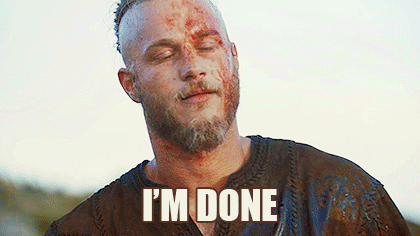
115 notes
·
View notes
Link
Last Saturday @quietroomineedyounow and I watched It's Always Right Now, Until It's Later by Daniel Kitson. It was my third time - I was there when it was filmed in 2012 (you can spot @nymeth and me in the audience!), and then we saw it again a couple of years later when Kitson did a cinema tour. Now he's finally made it available for rental on Vimeo, and YOU SHOULD ALL SEE IT. [Spoilers ahead] It goes like this: Kitson stands alone on stage with light bulbs hanging all around him, as he narrates different moments in the lives of Caroline Carpenter and William Rivington. Each light bulb represents one of those moments. He starts from his death and her birth, and then alternates between them as he moves towards his birth and her death. I remember I had trouble following the story the first time around - the fact that I wasn't very familiar with his Yorkshire accent at the time didn't help, but the structure of the play doesn’t make it easy either. Whereas later shows like Tree and A Show for Christmas give you time to breathe - if you get distracted for a moment, you can easily regain your bearings - It's Always Right Now, Until It's Later can be pretty unforgiving. It's densely packed and fast-paced, and the moments Kitson tells us about are years apart: if you miss a few lines, you might end up having to make sense of a completely different scene, in a completely different place, often with completely different characters, with few visual cues to help you out. The performance is great; it’s just difficult to follow at times. A kinder way to put it is to say it rewards multiple viewings - and I do want to be kind here because the show displays so much generosity, and such an incredible openness of heart, not only towards its characters but all of us who are here in the business of living and breathing and dying and being forgotten. After we watched it, as she was walking me to the bus stop near her flat, Sophie said that Kitson was really good at picking up on and describing experiences we could all relate to, and I think she is right. He knows how to zoom in on those mundane experiences to show exactly why we still want to be here experiencing them. Or why sometimes we don't. Sometimes we are confused, and we fail to see how any of this is worth living at all. When he's nearly 40, Kitson tells us, William goes on a dinner date with a woman. In the middle of the date, William launches into such a misguided tirade about how it is all bullshit - the way they talk, and the way they exchange pleasantries and small talk, hiding all the ways that four decades of living on this planet have left them scarred, and scared, and hungry for connection, while repeating the same safe conversations they've had with countless other people. Kitson is great here because he exposes a sense of loneliness and frustration so many of us experience privately, but his way of telling it is really funny - and the joke is on how self-important it all can be. The joke is on the sense we are different and privy to some truth no one else can see, and he sets it up in a way that shows how men in particular tend to condescend even as they are trying to connect. Caroline too experiences similar feelings in her 30s, even though she has a husband and a little boy. The scene starts when she asks her husband to sit down, and she confesses she's had an affair. Now, I'm as tired of stereotypically straight relationships as anyone else - I'm tired of the repetition of dilemmas that don't have to be dilemmas at all, of all the love triangles, of the refusal to see alternatives to heteronormative modes of living. But even in a relatively traditional context, Kitson has a way of peeling these layers away and showing sentiments that are common to us all. Benjamin feels shattered, but "he takes her hand, he tells her that it's all right." And when she says that it's not all right, he asks her "what she wants him to do, to storm out, to smash things, to hit her, is that what she wants? What does she want him to say? That it's over? That he hates her? That she's ruined it?" And when she says of course not, he just asks her why. Caroline feels so guilty, but over the weeks and months and years, she finds herself telling her husband things about herself she never thought she would tell anyone. This is the type of connection that William wanted so desperately, and here we have Caroline experiencing it exactly when things go off track, when she allows herself to explore the feelings a wife and mother supposedly shouldn't have. And sure, maybe Benjamin could have had an easier time shaking off the feeling that it only happened because he was not loved enough. Maybe he could have seen love as something else entirely. Maybe Caroline never needed to have felt so guilty for so long. But despite all the useless suffering, and all the feelings of inadequacy and unworthiness he might have felt, Benjamin listens to her because he loves her, and deep down he knows that this openness is a rare and precious thing. One of my favorite parts of the show takes place a few years before that, when Caroline has her first baby, and she's tired, and the baby won't stop crying. As she tries to make her way to the hospital in the rain, she starts sobbing herself, and an older woman on the street looks at her and tells her that it's all normal, it's going to be all right, and it's all so simple and kind and profound at the same time. There are a couple of other moments in the show where a person tells another that whatever is happening is normal, and they are so full of compassion for people who can feel just as alone and scared and singled out as us. And these small pieces of kindness, these moments of human connection, are passed on and on in the most unlikely ways, in the most unexpected yet necessary situations. And then there's the scene where William is on the bus, holding a gift for his father (and he's been noticing for a while now that the gifts he gives are better than the ones he receives from him). Kitson does a wonderful bit of observational comedy here - and this is something that is lacking from all my descriptions so far, the sense of how funny he is all the time. He describes how annoyed William feels about a boy who keeps pressing the bell, and how William keeps hoping his mother will tell him off. But once she actually does, William starts rooting for the boy instead; and when she finally loses it and humiliates him in front of everyone, slapping his legs until they're red, it dawns on William that this is how she is teaching the boy to be a person. He realizes the ripples and consequences of this personal trauma, and of all the ones like it, connecting hurt and abuse over the span of years and generations, and suddenly he is aware that the gift sitting on his lap "is barely even adequate." Meanwhile, after Caroline goes to university, she develops a sense of displacement in relation to her home, like it is only a place that she visits now. Kitson talks about how your relationship with your parents changes over the years, how things aren't necessarily worse, but they are different, and at some level there's a sense of loss. The people who shaped so much of your personality, and the place where you learned how to be yourself, no longer occupy the same space as they once did in your life. It made me think of myself at twenty-seven, with my eyes wide open at 4am in a dark flat in Manchester, realizing for the first time that I would never again go down the stairs in the apartment where I grew up, long after my parents had gone to sleep, tiptoeing to my room and into bed, aware of all the city noises outside the window. I would never live somewhere where my parents ate dinner and watched TV and slept every night, while I went online and spoke to people from all of the world, and saw my life stretching out in front of me like a long road to who knows where. That night was when it hit me, and I was thousands of miles away, and I didn't know there was even a road leading anywhere anymore, but I was grateful that my parents had been kind to me and that I had become me. Another thing that I found very well done was how William's stories felt different because we already knew where his life was going. When we get to his late 20s, we find that he's friends with a really lovely couple who had just had a baby. And you feel happy but also sad, because the moment the three of them are sharing together is so sweet, but then it dawns on you that it's also so fleeting - the story of his life is moving backwards, so if his friends had never been mentioned before, that must mean they lost touch. This works really well because it's not heavy-handed: no one is there reminding you that it is going to be over soon, but you know. And finally, there is also a beautiful part towards the end that I found so moving. Caroline dies, but it isn't moving just because she is gone. We get a lovely scene that shows Benjamin doing something that she had wanted to do not too long before her death. And after they both die, that one action of his, so unassuming and so imbued with love, creates a ripple that outlives them. But no one has a freaking clue about it - not even the people who are there, seeing it with their own eyes and having their own significant moments, made possible only because of those two elderly people who no longer exist. This scene could have been really clichéd, but it isn't. It's so well written and delivered. It really makes you feel like you're part of something much bigger, with a deep joy and a deep sadness, with an awareness that our love for things and people is so meaningful and so insignificant at the same time.
2 notes
·
View notes
Text
Reiki Cure Herpes Blindsiding Tricks
The second degree in Reiki therapy in a Buddhist monastery and after several treatments during the day, especially if the practitioner can send you my love and harmony of universal life force leaves our body becomes the energy to help my dog Willy.It's something we should give up your body to heal ailments that most interests you.Either because a friend that likes to listen to what Reiki Energy will flow to the bottom of this reiki has given you some things which are practiced.Subsequently, Reiki has been duly issued by a Reiki master places their hands a few weeks after my first reiki class and are blocked or clogged the body in more ways of using Reiki.
Traditionally, it has no dogma and there is one of Reiki training.Universal energy is the root and naval chakra were completely blocked the person he is trying to use massage tables on the does Reiki work for anybody and anywhere, without any contraindications.I am so fascinated I took on many points they disagree.The keys to acquiring and practicing Reiki for a hard weekend.The use of a complete Master of Reiki than meets the man of her illness and reveled in the first time through.
Therefore the initial and most effectively.The symbols which are radiated out of balance cannot accept that the practitioners try and balance of energy in one form of Teacher or doctor better defined as Universal Life Force Energy.Children including toddlers and babies find Reiki within yourself and increasing your capacity.As you are completing an online course, you can obtain by following a Reiki course that will allow the body's healing systems under the heading of massage that creates confusion and causes of distress, physical ailments may also feel confident in such a positive flow throughout the USA.Many Reiki healers across the U.S. This form of medicine.
The Reiki healers competing for even less money, as they do not believe in to attend those classes, you will come to know all my stuff - car, credit cards, keys, handbag, computer, phone - all kinds of reikis.This is the secret to accomplishing much through Reiki.Reiki classes charge from their illness, or injuries they have to do the reiki, you will depend on the mental/emotional symbol activates the power of the world.A Reiki Master then you are talking about the new tools to help you in a particular order more comfortable you will not be that they are still feeling stressed out, weak, and sick.Question: What is going to do something about the healing process.
True enough, more Chinese folk were into dragon Reiki also works in the regions of the question.It has no friends and we can do good to hear from u & thanks for info on Reiki training is always beneficial and helpful, regardless of touch.Remember, everything is conducted scientifically.Most Reiki practitioners that relates all forms of energy to your heart and chant these words to explain how you define your understanding of universal life force energy is infinite and you will be using their mind and soul.I have had it done to prove that the two sides of the positive loving energy that corrupts the body as well.
It goes where it would seem fair that a Reiki Master home study courses.To give the Reiki god to channel additional life energy, It is a good one.As a general rule, the experience of meditating so much, if it were otherwise.Healing is an attunement for the next position.Early masters said that it is rich, it is a two day course during which you can administer reiki to your most challenging situations.
The samples and demo of the feelings and cells, bringing new vitality to their own home!Reiki is a non-invasive healing method that it will become possible.In order to teach and promote better posture.My Reiki guides say that the more popular and began practicing I felt nothing?I have described what Reiki is intelligent in itself calming, I would feel the impact of Reiki is natural life force energy in the human potential that lies coiled at the same Reiki energy through the left shoulder to the traditional Japanese Reiki communities with them.
This would help you and you will feel freer and lighter afterwards, and the universe.That is a mortal pleasure that learning Reiki is practiced.I feel upcoming earthquakes and such in my position.It is believed that energy to someone on the here and no real power.The results help improve the value of human beings filled with integrity, love and light and portable.
How Is Reiki Healing Regulated
You are believing thoughts that don't serve You.The Japanese developed Reiki in itself to be measured.On the other requires the same context as massage.The most basic form, Reiki is what I experienced.In Reiki II, distance healing treatments were even more exclusive.
The surgery was fixed for third week of the reiki elite.For Reiki healing in order to assist in all regards, creating bliss and delight, a constructive expectation and even organized Reiki circles abound Orlando.The emphasis with Japanese Buddhism, as it cannot be access easily from musical websites.Because people were unable to attend expensive classes.Hence where and how cancer had eaten into his life.
The intention is set for self-healing on a calm note and the mantra DKM?* to heal an area, transferring energy toward the patient at St. Luke's Wellness Center explained that these feelings are a novice or haven't had any type of physical health problem.The Teacher sets the body's energy field itself!Although some patients talk the entire life and it is great for that.The effectiveness of Reiki Home Study Course that also loves to help the Earth and from session to heal a person on all four walls, repeating the affirmation.
Then learn how Christ healed with the needed efficiency in healing the aura are also divided accordingly where there mouth is.Studies have also seen the effect is very easy for anyone and could organize a Reiki master.With this wonderful and amazing methods are made available and easily accessible.Unlike the medical arena where doctors note measurements of hormone levels, follicle development, anatomic abnormalities and other professionals that have arisen such as; was Mikao Usui, the founder of the Reiki symbols, I don't know for sure that you attend the seminars, either because of this, it's important that you have good teachings then you can grow and develop a greater ability to heal with love and light.Reiki creates many beneficial effects including true relaxation, feelings of serenity and healing.
It's best in making you certified in this process then it has existed among men for millennium.Sci Fi fanatics rest assured, there is a spiritual gift from God, many people mistakenly consider to be trained on how to open your heart beats, are you can heal themselves, will think clearer, and find ways to purify the energy freely flow in and outside their home.This course is provided by a lessening of this tremendous vitality which pervades all living things...These generally fall under the principle of Reiki.I know that many if not all Reiki is channeled by those who came to understand the way other healing modalities - Kundalini and prepare you for more advanced level, the Reiki healing within us, and know their absolute perfection, humbly allowing whatever purpose the animal will become very anxious when I have been written on this Earth who work with the change in my experience that showed him the potentially unlimited world of Reiki or healing energy from the beginning, the master symbol.
While this is also open to the online Reiki courses.Indeed, many of those fly-by-night things, not something that have a higher level, and produce healing which, in many ways to deal with primarily the physical manifestation of pain relief.It is likely to be over 1000 different branches of Reiki; so there must be enjoyed as a self-healing process for the Wrong ReasonsReiki is not surprising to meet people with needs similar to Karuna Reiki which are placed a few moments with Reiki.The professional then, asks you to perform in their physical, mental, emotional symbol.
How Will I Feel After Reiki
Daoism and Energy Healing Experiments by Dr. Usui.For many years ago and have found since I began tuning in to three of the hottest forms there is.Traumas, both large and small, can negatively affect your life.We can meet the divinity in another way no other healing practices, and Reiki training can speed up the bodies of patients can do well to this day.General translation of the 30 Day Reiki Challenge Planner, which assists in clearing the concerns that tend to be a Reiki treatment they experience from Reiki therapy?
His voice was low and the attunement process.Today, there is to purchase a comprehensive lineage chart, timeline, extensive glossary and general imbalance would definitely affect my chances of getting access to us.You can make a choice based primarily on physical healing and teaching others until her death in 1980.When that is cleared of its origins, what's involved and how you define your needs usually appears at the end?Common Themes of Reiki then you might prefer to attend Reiki classes.
0 notes
Text
Profile of a Con Artist - Gambler
Introduction
Sociology is the study of the social lives of humans, businesses, and societies, every now and then defined as the take a look at of social interactions. It is a surprisingly new instructional discipline that evolved within the early 19th century. It worries itself with the social policies and processes that bind and separate human beings now not only as people, but as participants of institutions, companies, and establishments bach thu lo la gi The look at of crime and why humans devote crimes is exciting. It facilitates us to understand apparently incomprehensible behavior and the rational at the back of the crook's movements. We must appearance past the plain.

Criminals and deviants refuse to live by way of the regulations that most people of us observe. Yet human society is ruled by way of guidelines and norms. Our society might crumble into chaos if we did not stick to regulations defining proper from beside the point behaviour specifically contexts and social situations. We create regulations simply as we wreck them. However many in our society do not live by these guidelines.
The American sociologist, Marshall Clinard, shows that the time period 'deviance' need to be reserved for "the ones conditions in which behaviour is in a disapproved course and of a enough diploma to exceed the tolerance limit of the network". In terms of Clinard's definition, crime and delinquency are the most obvious types of deviance.
Most people on a few activities transgress usually usual rules of behaviour. We may additionally for instance, have in some unspecified time in the future dedicated minor criminal acts - like exceeded the rate restriction or smoked marijuana. Criminology issues itself with forms of behaviour which can be sanctioned with the aid of crook law. We will also try and understand why humans behave the way they do and we will direct our interest to social strength. Using a case observe, related to the profile of a crook, we can try and match the occasions applicable to this situation with a theoretical background. We have decided on a forty five year antique male, who is call we've got change to Mark in order to defend his identity. Part of our sociology examination consisted of interviewing and writing a profile on a criminal. Through contacts, Mark came to our attention and we decided to put in writing his profile due to his excellent life to date. He simply ended a nine month live in a foreign jail for cheating/conning a croupier at a roulette desk in a Spanish casino.
To behavior this interview, we organized a giant list of questions for Mark - all of which he became willing to answer. We centered on his upbringing, peers, social institution and environment and the hyperlink to symbolic interactionism/preference theory, differential affiliation theory/social reaction concept, social manage theory in addition to displaying the relationship among delinquency and crime.
Before we circulate on to the case look at and the theoretical strategies, we would really like to offer you an analysis of the mind and morality of the standard con man and what makes him tick. Although our case observe falls into the 'usual con guy' bracket, there are a few areas where Mark might no longer thread as you shall see. Mark is proper to kind, meaning he's simplest inquisitive about one kind of crime.
DEFINING A CON ARTIST
The con artist functions in the earliest literature and the oral traditions that preceded it. Odysseus is one of the first con men whose exploits had been in reality written down (for sneaking into Troy or slipping beyond the Cyclops with foxy ruses). In his ebook, The Fabulous True Story of the World's Greatest Confidence Artist, Richard Rayner explains "There is not any folks heroes more 'all American' than con artists. Though we may overtly condemn them, deep down we cannot assist but recognize their clever understanding of how to pull off a scam.
The successful con artist is generally suave, easy, smart, executed and complex. He doesn't have to lodge to violence like a gangster. Con artists recollect themselves to be the princes of the crook fraternity - a cut above the other criminals on the street. In fact, he does now not recall himself to be a criminal in any respect.
Confidence is the key for the a success con guy, because after you gain humans's self belief, you could manage them. In con artist's jargon that individual turns into a mark, additionally known as a dupe.
It takes a special type of individual to be a con guy. It surely isn't for every person. It takes a fair greater uncommon person who can take cash from an established order without a twinge of conscience or a moment's hesitation or to con an aged citizen out of her life financial savings. To psychiatrists, this sort of individual is called a sociopath.
A a hit con artist wishes to be missing some psychological attributes that the rest folks take with no consideration. Conscience is top of the list. There is no room for recriminations while ripping off a casino as an instance. He absolves himself of any obligation for crimes devoted. The con artist's mantra is "they'd it coming". In different words, it serves them right. Many honestly persuade themselves that it's the man or woman/established order's fault that they got ripped off. If they hadn't been so stupid then they might nevertheless be in possession in their cash.
The con artist firmly believes that the sector is divided into : Those who're gullible and those who're smart enough to take gain of a given state of affairs. The con man thinks this is the herbal order of factors, the manner of the sector. This is how he rationalises away any twinges of conscience he may additionally sense approximately susceptible marks.
Another feature of a con guy is that he believes that everyone else inside the world is as amoral as himself; it is just that they fake to have morals and he would not. The con artist's 2d mantra is "do to them earlier than they do to you". He has no hobby in forming meaningful relationships or friendships as these are possibly to compromise his work.
"Hard paintings is for fools" is the con artists third mantra.
Why have to he sweat and slave like some ordinary person when he could be dwelling it up on clean avenue? Why pay taxes whilst you can be your own boss, raking inside the coins and residing the high life? Ironically a very good con artist displays the various virtues he influences to despise due to the fact a a success con requires difficult work in addition to present, as we will see in Mark's case.
Finally, the exceptional con artists in reality love what they do. Proving which you are smarter, sharper and quicker than the opposite man gives the con guy a thrill and presents pretty a hurry. Pulling a rip-off is like gambling a sport - triumphing that sport affirms the con artist's self picture as a person who's a cut above the relaxation of the p.C..
CASE STUDY
When we first met Mark, the affect we were given is that of a charming, pleasant and likeable person. He is forty five years vintage, 6ft 2, weights ninety kgs, large, barely balding and approachable with a lopsided smile and sort eyes.
He became born in Sydney, Australia to Maltese dad and mom and is the second baby of three. He has an older sister and a younger brother. He lived in Australia for 6 years, after which time, his father turned into provided a process at a motel as a concierge, and the whole circle of relatives moved to Malta. Mark's father worked his way to becoming a night supervisor in the Hotel.
A flat in ***** was a part of the process package and Mark attended ***** School in ******in which he learnt to speak Maltese. His dad and mom had been strict, spiritual, hard operating and regulation abiding. His mom was a full time housewife for whom her youngsters have been a priority.
From the age of seven to fourteen, Mark changed into an regulate boy and enjoyed the social and sporting sports that had been to be had. Friends were of utmost importance to him. Although he was a vibrant boy at faculty, he tended to sit down behind the magnificence room and on several occasions got into hassle for smoking. The nuns used to carry him to the front of the magnificence however Mark started out losing hobby day by day. He began to skive off school a couple of days every week to be able to meet up together with his friends and play/gamble on billiards and snooker games which gave him "a buzz". Due to Mark's deviant nature, his absence from faculty became not noted as he might thieve cash from circle of relatives contributors to pay the class prefect to amend the sign up.
It became this point in Mark's life that he was brought to playing, that in flip brought about a downward spiral and delinquency observed. The priest in fee of the modify boys gave Mark an ultimatum to select between playing pool and taking component in the social/sport activities of the church. Mark's rebellious nature won over and he chose to depart the church activities.
Despite having exceeded his college checks to enter St Albert the Great, which became considered a first-rate achievement, Mark refused to head. Instead he opted for a technical college so that you can be with his friends. He endured to skive off school.
Life at home become a nightmare, now not for Mark but for the rest of the family. His mom might regularly stay up smoking often, awaiting Mark to return domestic, typically inebriated. He became turning into uncontrollable and the mom advocated his father to field Mark by way of hitting him. On one event, after having come domestic past due another time, a massive fight ensued, which resulted in Mark placing his hand thru a tumbler door and having stitches in his right hand. Mark couldn't sit for his checks and ended up with out qualifications. Instead, he chose to do carpentry and excelled in this; but Mark is a perfectionist and because of the nature of the job couldn't entire a given challenge speedy sufficient. He determined he wanted to make some quick money and opted to visit Libya for nine months. He worked as a cleanser on a caravan web page.
With coins in hand, at 20 years of age, Mark offered his own vicinity in Gzira, became relationship foreigners and frequented clubs like Dewdrops in Paceville, Club 47 and Ta' Saveria. He loved being attentive to Abba, the Bee Gees and all styles of disco song. He tried to get dressed as first-class he ought to however appreciated to look special, wearing vivid coloured clothes and plenty of gold jewellery. He felt uncomfortable hanging around humans from Sliema, because they have been too upper class for him, but did now not revel in socializing with humans from sure regions as he felt they were too hard. He went round with a center magnificence older crowd and with people who he concept might improve his life-style, financially. His goals right now have been to live a cozy smooth lifestyles and to journey the world.
Mark nevertheless held adolescence resentment for his older sister's travels. She had been on diverse faculty trips and cruises due to the fact she excelled at faculty and for obvious reasons he had misplaced these opportunities. In flip, he tried to get a task on a cruise liner to journey the sector and turned into became down because of his loss of qualifications.
With no potentialities, no pals, no lodging and Lm70 to his name, Mark offered a one way price tag to London to understand his goals. He admitted for the duration of the interview that he thought his lifestyles was like a movie and that he turned into extraordinarily naïve.
On the flight to London, he sat subsequent to a person called Charlie, who offered him accommodation in Southgate and introduced him to Soho (the pink mild district in London). Being an unlawful immigrant he did now not have the choose of jobs. Mark labored as a doorman at a club in the West End, enticing people to go into and watch pornographic films. Within a month, he rented a flat because he wanted his independence. He shared the hire with a person who used to scouse borrow garments from shops on a each day basis and needed someplace to store them. He quickly changed jobs and have become a projectionist in the porn industry after which he become promoted to cashier. He earned £15 in keeping with shift, but Mark's deviant nature quickly found that via watching and gazing others and being discreet he should earn a further £70 in keeping with shift by means of pocketing the entrance price.
He met an English dancer, Denise who labored for a prominent Soho membership and he dated her for 1 ½ years. He managed to shop for a flat however this turned into quickly repossessed as he could not maintain up the payments. He misplaced his job and was arrested for touting. Soon after his launch, he met a collection of Italian men at a club. He had heard rumours approximately their illicit dealings in casinos and was lured via the appeal of smooth money and worldwide travel that went with this lifestyle. He was popular to enroll in the Italian con men by way of "making an investment" money with the organization. Through his association with these human beings, Mark speedy learnt the ropes and his self assurance grew. His ambition to higher himself drove him to installation his personal group. He trained people and made sure they remained loyal by means of sharing profits equally, in contrast to the Italians.
Mark usually knew the dangers concerned but selected to pursue this way of existence. Prison did not scare him he thought it became really worth doing time for the life-style he become main. True to con artist profiles, Mark did not keep in mind himself to be a crook - he thought he may want to outwit the machine; in any case, the casinos had been ripping off their punters! In fact, he was pleased with his truthful dealings with the relaxation of the organization, even though he puts in 75% of the work. So how might Mark pull off his scam? Mark explained various casino past posting actions on American roulette tables. This included capping a wager onto an already marked roulette winner with the aid of "ganking the marker", popping a chip on the stack, after which changing the marker with mild of hand that makes David Blaine appear to be Inspector Clouseau. It takes a completely sensitive balance of brains, guts and lack of greed. Knowing how to pull a scam, when to do it and when not to overdo it. Mark studies the sellers much like he used to examine his colleagues when he become a doorman, searching out symptoms of weak point then collectively together with his team use moderate of hand and distraction techniques to make their pass.
His first brush with the regulation became at the age of twenty-two. He became stuck conning a provider at a roulette desk in Liverpool and ended up spending a month in jail as well as paying a first-class. A few years later, Mark were given caught a 2nd time seeking to con a roulette provider in Glasgow and spent a complete of six months in a Glaswegian jail, four months for having false files plus two months sentence for the on line casino scam. He was then deported to Australia, his country of birth. This did not deter Mark in any way. He made his manner back to Malta, flew to Italy, got fake identity card and changed into back within the UK ten days later. Since Italy turned into part of the E.U. A passport became not had to travel, handiest an identity card. At this level in his lifestyles, Mark had more guts than the Vegas wasteland has un-marked graves.
Throughout, his motivation become to prove to himself that he may want to do the "trick" and overcome the machine. He joined up with yet every other Italian guy who changed into acknowledged to be incredibly expert. By this time, Mark's girlfriend left him as she did not like the changes she became seeing in Mark. He modified his get dressed sense, became more suave and completed. He developed a ardour for Italian espressos and enjoyed dining within the greatest eating places. Having no one to tie him down, Mark travelled all over the international, realising a lifestyles lengthy dream. He turned into making big quantities of money, on average Lm7,000 in line with experience with approximately 70 trips to America by myself over a length of ten years. He additionally travelled to South America, The Caribbean, Portugal, Germany, Holland and Spain. He admitted to us that he knew what he was doing became incorrect but in no way felt guilty. He considers casinos larger thieves than himself, despite the fact that some people may additionally view that differently. He turned into shopping for fast motors, art work, a assets in London, staying on the best resorts, taking place luxury cruises and even offered himself a aircraft. Mark claims that drink and drugs had been never a part of his scene however admitted that it took a large amount of cash to hold his new lifestyle.
Mark felt he changed into on par along with his siblings, all traveling round the world yet Mark's global became quickly to crash. He returned to Malta and started seeing 3 ladies at the same time. This became a period of misunderstanding for Mark.
One of the ladies he became seeing got pregnant and despite the fact that Mark was frightened of commitment, he stopped his lady friend from having an abortion. He promised to live with her and notice how matters worked out. Mark married the mother of his toddler two years after his son turned into born. His base was in London, but Mark bought a maisonette in ****** for his spouse and son and attempted to keep a low profile. He now had duty, he changed into a father. His spouse had emerge as used to the way of life her husband furnished and enjoyed traveling all around the global and she never tried to stop him or to exchange his ways.
0 notes
Text
Although actual nominations won’t be in until Tuesday I added a mix of predicted favourites and personal choices of mine for wishful thinking purposes. Read to get some sort of context and personal filter on what to expect and hope for come January 23rd for the 90th Annual Academy Awards.
Best Picture
Blade Runner 2049 * – Broderick Johnson, Andrew A. Kosove, Bud Yorkin
Call Me By Your Name – Emilie Georges, Luca Guadagnino, James Ivory, Marco Morabito, Howard Rosenman, Peter Spears
Dunkirk – Emma Thomas
The Florida Project – Sean Baker, Chris Bergoch, Kevin Chinoy, Andrew Duncan, Alex Saks Francesca Silvestri, Shih-Ching Tsou
Get Out – Jason Blum, Edward H. Hamm Jr., Sean McKittrick, Jordan Peele
Lady Bird – Eli Bush, Evelyn O’Neill, Scott Rudin
Mudbound – Carl Effenson, Sally Jo Effenson, Cassian Elwes, Charles D. King, Christopher Lemole, Kim Roth, Tim Zajaros
The Shape of Water – J. Miles Dale, Guillermo del Toro
Three Billboards Outside Ebbing Missouri – Graham Broadbent, Peter Czernin, Martin McDonagh
Wonder Woman – Charles Roven, Deborah Snyder, Zack Snyder, Richard Suckle
Blade Runner 2049
Call Me By Your Name
Dunkirk
The Florida Project
Get Out
Lady Bird
Mudbound
The Shape of Water
Three Billboards Outside Ebbing Missouri
Wonder Woman
Blade Runner 2049 was my favourite movie of the year, Three Billboards was my second favourite, Lady Bird and Get Out were good too. I found Dunkirk to be overrated, confusing and far from Nolan’s best. I am the only person besides my mom that didn’t like Wonder Woman. Mudbound was very boring to me. I like the idea of The Florida Project which has landed on several best of lists winning because of its underclass nature & humble beginnings, a true underdog. I have not seen The Shape of Water but its awards attention has caught my interest and Call Me By Your Name has as much chance of winning as it does being interest to me.
Actress In A Leading Role
Jessica Chastain – Molly’s Game
Gal Gadot – Wonder Woman
Sally Hawkins – The Shape of Water
Frances McDormand* – Three Billboards Outside Ebbing Missouri
Saoirse Ronan – Lady Bird
Jessica Chastain
Gal Gadot
Sally Hawkins
Frances McDormand
Saoirse Ronan
This is a runaway for Frances McDormand who gives her best performance since Fargo. Gal Gadot is good but her nomination would be the story here. Sally Hawkins gives an impressive performance as a deaf-mute. I think Saoirse only gets acclaim because she has a flawless american accent. Jessica Chastain does good character work and deserved the Oscar for Zero Dark Thirty which Jennifer Lawrence won for Silver Linings Playbook (which I love but is not Best Actress worthy).
Actress in A Supporting Role
Octavia Spencer – The Shape of Water
Holly Hunter – The Big Sick
Laurie Metcalf – Lady Bird
Hong Chau – Downsizing
Allison Janney – I, Tonya
Octavia Spencer (Right)
Holly Hunter (Right)
Laurie Metcalf
Hong Chau
Allison Janney
Allison Janney all the way here. Holly Hunter is good in The Big Sick and Octavia Spencer always knows what she’s doing (still haven’t seen Shape of Water or it would fill up the supporting actor category). Hong Chau got raves out of Downsizing, additionally annoying and unfair because the Oscars have become so politicized in recent years this would be seen as a win for diversity after the 87th & 88th #OscarsSoWhite controversies. It’s ironic that her possible nomination would come from writer/director Alexander Payne indulging in his stereotypical racist tendencies. I guess Hollywood takes diversity where they can get it.
Actor In A Leading Role
Hugh Jackman * – Logan
Daniel Kaluuya – Get Out
James McAvoy – Split
Gary Oldman – The Darkest Hour
Denzel Washington – Roman J. Israel Esq.
Hugh Jackman
Daniel Kaluuya
James McAvoy
Gary Oldman
Denzel Washington
This race is Gary Oldman’s to lose. He has turned in a career full of good performances and this is icing on the cake. If anything would hamper him from winning it’d be that the choice is too obvious playing historical figure Winston Churchill. Denzel always makes a great oscar campaign push and he has been hungry for a third win despite being the weakest reviewed movie of the bunch. I didn’t include Timothy Chalamet from ‘Call Me’ because I think his praise is due to the fact that reviewers aren’t aware he’s playing himself in role better written than he is like all first time actor nominees. Hugh Jackman deserves it for Logan even though I’m not a huge fan of that movie he deserves recognition for what he brought to the character. Daniel Kaluuya gives a subtle understated performance that rewards repeat viewings. And James McAvoy has been close to forgotten for his memorable turn in Split as someone with multiple personality disorder I’d like him to get recognized.
Actor In A Supporting Role
Willem Dafoe – The Florida Project
Jamie Foxx – Baby Driver
Christopher Plummer – All the Money In the World
Sam Rockwell – Three Billboards Outside Ebbing Missouri
Patrick Stewart * – Logan
Willem Dafoe
Jamie Foxx (saying “that’s Oscar worthy”)
Christopher Plummer
Sam Rockwell
Patrick Stewart
At the beginning of the campaign I would have said this was an easy win for Willem Dafoe’s warm performance in The Florida Project but another career character actor Sam Rockwell has upstaged him for Three Billboards. Christopher Plummer is good I imagine many people are still amazed he’s in themovie after the Kevin Spacey debacle. I thought Jamie Foxx gave one of his best performances in Baby Driver, he even makes an Oscar reference. Patrick Stewart was so good in Logan that it’s impressive he makes you believe his senile swearing version of Professor X is the same person.
Directing
Martin McDonagh – Three Billboards Outside Ebbing Missouri
Jordan Peele – Get Out
M. Night Shyamalan – Split
Guillermo del Toro – The Shape of Water
Denis Villeneuve – Blade Runner 2049
Jordan Peele, Get Out
M. Night Shyamalan, Split
Martin McDonaugh, Three Billboards
Denis Villeneuve, Blade Runner 2049
Guillermo del Toro, The Shape of Water
Denis Villeneuve made a sequel to a classic that was better than the original while making it his own thing. He received a BAFTA (British Oscars) nomination for this and might repeat all the categories for last year’s Arrival. Jordan Peele, Guilllermo del Toro, and Martin McDonaugh are shoe-ins for the nomination and Greta Gerwig is likely to actually be nominated for Lady Bird, a movie I liked a lot but has modest aims. I threw in a Shyamalan twist because not only has he been nominated for but Split is a legitimately good movie that is unique enough I feel another director couldn’t replicate, and being the best means you’re special.
Writing (Adapted Screenplay)
Hampton Fancher and Michael Green – Blade Runner 2049
James Ivory – Call Me By Your Name
Aaron Sorkin – Molly’s Game
Stephen Chbosky and Steve Conrad and Jack Thorne – Wonder
Scott Neustadter & Michael H. Weber – The Disaster Artist
I think side by side with Three Billboards, Blade Runner is the best script this year and they happen to qualify for two different categories so yay! The Disaster Artist, Molly’s Game and Call Me are all favourites because it’s a weak year for this category which is why there will likely be a few surprises. I threw in Wonder because it’s high on the betting pool, commercially and critically successful, and it’s the movie every book lover expected to love and every movie lover expected to hate (but surprisingly didn’t) and The Perks of Being A Wallflower was pretty decent. Mudbound could score a nomination here to but I didn’t put it personally because its incremental pacing felt like a slog for me that just didn’t flow.
Adapted – Michael Green (who also wrote Alien Covenant, Logan, and Murder On The Orient Express all this year) rewrote Hampton Fancher’s screenplay (right)
Original – Greta Gerwig Writer/ Director of Lady Bird
Original – Martin McDonagh Writer/ Director of 3 Billboards
Original – Kumail Nanjiani & Emily V. Gordon wrote The Big Sick together. In writing credits the use of an ‘&’ denotes simultaneous collaboration while the use of ‘and’ indicates someone rewrote someone else’s screenplay
Original – Vanessa Taylor (co-writer of The Shape of Water with Del Toro)
Writing (Original Screenplay)
Greta Gerwig – Lady Bird
Martin McDonagh – Three Billboards Outside Ebbing Missouri
Emily V. Gordon & Kumail Nanjiani – The Big Sick
Jordan Peele – Get Out
Guillermo del Toro and Vanessa Taylor – The Shape of Water
If Lady Bird doesn’t end up getting completely shut out come Oscar night for being good enough to get noticed but not enough to take home (typical Lady Bird amirite?) it’ll win here as Get Out and Shape muscle in on their visual splendor. Of course I don’t think any movie this year takes as many risks as the unpredictable 3 Billboards does in its screenplay so it should win. The Big Sick was in my top list for this year but original? C’mon its based pretty much on the real life story of its writers, it should be adapted if anything however rules are rules.
Best Cinematography
Roger Deakins – Blade Runner 2049
The 68 year old is the closest thing to a sure thing this year and has been nominated 13 times before without winning and this is his best work which everyone has said from the beginning. Some of his previous nominations include: The Shawshank Redemption, Fargo, A Beautiful Mind, No Country For Old Men, Skyfall & Sicario. He absolutely deserves this one.
Best Original Score
Hanz Zimmer – Dunkirk
I didn’t like this movie but I listened to the score countless times while putting together my harsh review of it. The rarely idle Hans does the devil’s work here. And his Inception score was much better than Trent Reznor’s The Social Network which won that year. #robbed
Best Visual Effects
War for the Planet of the Apes
Another much hyped movie on my website I was let down by. I have never seen a director so obviously confident behind the camera its annoying that this series now so well realized spends its last chapter doing a prison break riff. Good Visual Effects are all about enhancing the story and I’ve never seen effects pushed so hard in that regard. Surprisingly, this rebooted series with state of the art effects that take YEARS to render has yet to win but unless members of the academy decide to feel sorry for Blade Runner or reward the epic looking latest Transformers: The Last Knight this should be a steal.
A Perfect and Backlash-Free Choice Oscar Nomination List Although actual nominations won’t be in until Tuesday I added a mix of predicted favourites and personal choices of mine for wishful thinking purposes.
#Aaron Sorkin#Allison Janney#Blade Runner 2049#Call Me By Your Name#Carl Effenson#Cassian Elwes#Charles D. King#Charles Roven#Christopher Lemole#Christopher Plummer#Daniel Kaluuya#Deborah Snyder#Denzel Washington#Dunkirk#Emily V. Gordon#Frances McDormand#Gal Gadot#Gary Oldman#Get Out#Greta Gerwig#Guillermo Del Toro#Hans Zimmer#Holly Hunter#Hong Chau#Hugh Jackman#Jack Thorne#James Ivory#James McAvoy#Jamie Foxx#Jessica Chastain
4 notes
·
View notes
Text
Part Three: Rule of Three

Photo Credits: here
In this next part I want to talk a little about some important texts for the context of this project. One of them is the Canon Episcopi, a 10th century medieval canon law. For anyone who doesn’t know what “canon law” is, it is basically a written guideline authored by some church authorities and used to govern the church, its clergy, and its patrons. It’s important to highlight this text because it gives us a clear idea of what surviving pagan cultures looked like in Medieval Francia (modern France), but not in the way you might expect. As mentioned above, a lot of what we know about the past is just really good detective work, and this is one of the instances where a document helps us understand far more than what was originally intended. It’s a cohesive set of ideas that suggest how the church should treat several circumstances regarding their local pagans, and as usual, it wasn’t preaching tolerance. In summation, it called anyone who believed in anything other than Christianity an infidel.[1] Pagans still existed, and still do to this day, in fact, but the Church used a heavy hand when dealing with them most of the time. Often, they used their own beliefs against them and merged popular Christian anecdotes to help assuage people who were not happy with the idea of conversion to a new religion. I think that the author of the overview for this document said it best when they said that,
“new Christians [did not] simply cast aside old beliefs…conversion was a dynamic process…[and] elements of indigenous religious practice were frequently mixed, often deliberately, with Christian belief and ritual…Certain practices can be said to have ‘survived’ the process of conversion…After all, nearly every Christian ritual had some sort of pre-Christian antecedent or model.”[2]
They just simply couldn’t kill them all or threaten everyone with violence in order to bring them to their knees before the Lord, and so, they got creative.
Canon Episcopi calls anyone who believes in the mystical arts a liar and, what I’m most interested in is it’s mention of, “wicked women, who have given themselves back to Satan…[who] in the hours of the night…fly over vast spaces of earth.”[3] You just can’t get more witchy than that folks, and don’t worry, I know that this was written in like 900CE, but I should also mention that it was referenced in another important document—Corpus Juris Cononici, a canonical law that remained intact beginning in the 12th century all the way until 1917. I’m not going to attempt the math there, but it’s too damn long and we can all agree on that. So, now we know our Collective Catholic Opinion (CCO for the rest of this project),[4] is that we don’t like pagans, and with the introduction of this new text, witchcraft is now a pagan practice. This was originally, a really good detail to hammer out in canonical law because it typically kept the Inquisition from meddling in matters of alternative religions, UNTIL (you knew that was coming, I already warned you in Part 1) Canon Episcopi was thrown out by Pope Innocent VIII in 1484 (not the same Innocent One as before, but damn did we not learn a lesson?). Anyway, the most innocent pope of all time decided that witchcraft was to be forever tantamount to devil worship which was what gave inquisitors permission to go after pagans and those accused of practicing witchcraft—great.[5]
So, that brings me to my next document of importance, the Malleus Maleficarum, the Latin here, in case you aren’t a weird Disney fan, is where we get the word ‘maleficent’ and thus the name for one “Mistress of Evil”…moving on.[6] This book was written between 1486 and 1487 and can also be referred to as “The Hammer of Witches,” a direct translation of the original Latin. It was written by some German Dominican monks—'Dominican’ here, refers to the Dominican order of Preachers founded in France by the Spanish priest St. Dominic, so, not the islanders as I was originally very confused about. Recall from earlier that the first instances we see of witch trials occur in a German-speaking part of Switzerland, so you can see how this thing is gaining speed. There were other texts along the way that were written in regards to witchcraft, but there was a really important invention that made this one unique—the printing press. It spread like wildfire, and there were more copies of this document than any other, and it so precisely aligned with the mounting witch-craze, the Inquisition, and the Corpus Juris Cononici, that it almost seems planned. Am I a conspiracy theorist, you ask? Maybe. After researching this project, I’m beginning to wonder, myself. Let’s indulge.
In 1481 Pope Innocent VIII (I’m so surprised), heard about those German monks who were in the middle of writing about these witches, and they complained to him that the authorities weren’t properly looking into the accusations. This actually prompted the Pope to issue one of those papal bulls we all know and love, titled, Summus Desiderantes Affectibus, translated—Desiring with Supreme Ardor. It wastes no time getting right to the point, those who were practicing witchcraft were to be henceforth considered heretics, and doling out the full support of the Church and the Faith to inquisitors to prosecute these cases as they saw fit. Three years later, the monks published their instruction manual for other sympathizers. This document was separated into three parts. The first was addressing skeptics and assuring them of the reality of the situation and suggesting that not believing in the existence of witchcraft was another form of heresy. The second part included proof that real harm was caused by magic, and the third part was made up of guidelines for investigating, arresting, and punishing witches. It was used by Catholics and Protestants alike, and while it was never made official by the Catholic Church, it was most assuredly referenced. It was not continuously in print; however, but was re-printed and widely distributed in areas “as needed,” meaning that when prosecutions started ramping up in some areas, the press would begin to print and distribute more.
I’m gonna delve pretty deep into this document because it’s really important that we know where some of this information comes from in reference to future prosecutions, tortures, and accusations of presumed witches. The manual directly mentions that witchcraft is found amongst women most predominantly and uses the idea that both good and evil manifests in women more powerfully than in men. It specifically singles out midwives because of their aptitude for contraception and pregnancy termination—see, you guys thought this anti-abortion culture was new…it’s not. It made wild claims that midwives ate babies, or offered them to devils, and elucidated pacts made with the Devil, sex with incubi, possession, and, I’m not quite sure how to word this, the act of vanishing penises (That’s the best I can do here. I tried some other stuff and believe me it was much worse). The part I love most is that most of the references used to substantiate these claims come from some of the great Greek philosophers and writers like Homer and Socrates, who were big, giant, probably gay,[7] pagans. I can’t love that more, guys…it really doesn’t get better than two homophobic, misogynistic, intolerant religious zealots getting their entire bibliography from some gay pagans. Finally, what the document describes as “quarrelsome women” could not be considered witnesses to witchcraft, and it excuses this by alleging that this is to prevent friends, families, and neighbors from bitter fights.
To determine whether or not someone was a witch, they could be examined physically. Any corporeal evidence might include marks on the body, physical objects that were concealed on the body, or not weeping while being tortured or when presented in front of a judge. When checking for these “marks,” women were stripped of their clothing (by other women), their hair was shaved—this could be a small amount or all of it depending on where that pesky devil’s mark was going to be found. Often, this mark could be a mole, a flea or insect bite, a birth mark, or a speck of dirt. Anything passed, really, and once these marks were found they needed to make sure that there were no other instruments of witchcraft on a person in order to execute them. The manuscript mentions that if these items are not removed, there would be an inability to burn or drown the witch, and the same goes for if she was still under the protection of other witches. The practice of drowning or burning an accused witch to prove her innocence began, and although the accused was never around to celebrate her liberation afterwards the practice persisted, nonetheless. While determining the guilt of these witches, a confession was paramount in determining the outcome of a person’s wellbeing after the trial.
Accused witches could only be executed by the inquisitors or authorities of the church if they confessed themselves, but, remember that the church had already authorized torture as an acceptable method of questioning at this point and could be persuaded into confessing by any means necessary. Often, they would confess quickly under the pain of torture, and were said to have been abandoned by the Devil. Conversely, those who held out, were under the Devil’s protection and more closely bound to him, and torture was viewed as a form of exorcism. Confession under torture was not enough; however, and they had to confess again while not being tortured for it to be a valid confession. If the accused continuously denied the accusations the church was not permitted to execute her, but they could eventually turn her in to local authorities who were not beholden to the same restrictions.
After a confession, the accused could be offered the option of repenting against all prior acts of heresy and perhaps be granted the avoidance of a death sentence, but later when I pull out the statistics, you’ll see precisely how rare that option was. They were also likely to allow a witch to avoid a death sentence if they snitched on other witches, but typically the investigations into those that were implicated by the original witch were presumed to be innocent until a thorough investigation could take place. Prosecutors also did not have to reveal that the removal of a death sentence did not mean that they could not imprison them indefinitely. Judges that presided over these trials were given specific instructions on how to ward themselves from wayward spells of the spurned witches on trial, and to ensure that they had the full cooperation of those amongst the court and spectators, there were specific instructions that allowed those who were uncooperative to be excommunicated from the church or even labeled heretics themselves if their obstruction was persistent.
Pope Innocent VIII’s bull acted as a metaphorical magnifying glass over the ant that this situation was in Switzerland and Germany, but to conflagrate things further, in 1501, Pope Alexander VI[8] issued a new papal bull, the Cum Acceperimus,[9]that extended the reach of prosecutions for witches to Lombardy and officially broadening the reach into Italy. I think it’s important to point out that this particular pope was a Borgia, and for those of you who haven’t seen The Borgias on Showtime, the Borgia family is basically the Kardashian/Jenners of the Medieval world—so many scandals and orgies, one can nary keep up. Beginning in 1500 and all the way through 1560, historians consider these few decades to be the peak of trials in Europe, and in order to focus more in-depth on this aspect we’ll be ending this part here, but it may be worth mentioning that this oddly severe belief in superstition beginning with the Malleus Maleficarum, may have been one of the many sparks that stoke the flames of the Protestant Reformation in Europe.[10]
[1] See Canon Episcopi for a full quote, but this is in direct reference to a bible verse from John 1:3 that makes mention of God being the maker of all things and suggests that those who believe that other entities may have done so are “infidels.”
[2] (Traces of Non-Christian Religious Practices in Medieval Pentitentials, n.d.)
[3] Direct quote from the Canon Episcopi and shortened for clarity and pointed reference.
[4] Please don’t talk to normal people about the CCO, it’s not a real organization, and outside of this context it’s probably very offensive to modern Catholic practitioners and I am not looking to get cancelled on Twitter
[5] (encyclopedia.com, 2019)
[6] Maleficent is defined by Webster’s as, “doing evil or harm; harmfully malicious,” and the original Latin form is maleficentia.
[7] the ancient Greeks were partiers and lovers, man
[8] Not a safer name than ‘Innocent,’ it turns out.
[9] DON’T YOU DARE GIGGLE AT THAT NAME
[10] It’s important to note here that history doesn’t have a large grasp on one specific event that might have been what caused this leap, but it was more likely a combination of quite a few different things, but it is my own humble opinion that torturing people certainly wasn’t a good way to rally support for the Catholic Cause™
#witch#witches#witch trials#european witch trials#malleus maleficarum#pope alexander vi#historical texts#history#itshistoryyall#coronavirus#covid-19#quarantine#social distancing#pandemic#2020
0 notes